
George Hitchcock
b. 29 September 1850
|

Scott Creek
In The Garden: Photographs by Joel Leivick
Scott Nichols Gallery
via gmtPlus9 (-15)
_______________________
The Library
Henry Gould
.......
Only a shell, time's snail-pace carapace,
her modest midwestern façade, our civic
edifice. Inside, the expanding universe
of wide-eyed plains – palmetto groves – blue
tiers of Norway pine. . . thus plum-colored
bricks unpin the fan of Scheherazade.
And it seems my memory, our memories,
are stored up there, as autumn comes on.
Just as the ghostly palpitation of a Jack
o'Lantern lures the last of the moths,
we are reeled inside, we are taken in.
Up to the too-familiar, foretold dénouement –
bedtime, little Bookworm – turn out the light!
Feet beyond the door diminuendo (autumn rain).
...(more)
Autumn at Poet's Corner - Fieralingue
assembled by Anny Ballardini
_______________________
Richard Hoffman reports on the Simmons International Chinese Poetry Festival
Mnemosyne's Memes
I want to write here about my participation in the 2nd Simmons International Chinese Poetry Festival, October 3-5, 2008 here in Boston. I was part of a panel on the process of translation with Michelle Yeh of UC Davis, perhaps the foremost translator of contemporary Chinese poetry, and Chinese poet Leung Ping Kwan. In attempting a translation of my poem, “Refugee” from Gold Star Road, a poem I chose for its supposed linguistic simplicity, the challenges of poetic translation soon became clear.(....)The theme of the conference, “Translation is a way for us to listen to each other” was realized in any number of ways beyond the act of translation itself, and those ways included a deep exchange of ideas about fairness and justice, an understanding of shared histories, the role of poets in the necessary dispraise of dehumanization and disrespect for life itself, and the need to restore our debased languages as a first step to extricate our communities from the sticky web of half-truths and fictional histories that cloak the designs of merciless predation across boundaries....(more)
_______________________

Images of a Crisis?
Der Spiegel via
_______________________
Welcome to the faith-based economy
Arjun Appadurai
I instantly saw that a great feat in reverse discourse engineering had occurred: we had moved into the era of the “Faith-Based Economy.” Many of us had already developed a certain worry about the place of “faith” in the Bush administration’s weird form of ecumenical evangelism, which had used the idea of faith-based organizations to allow the covert infiltration of a certain brand of religion into American civic life, with a definite bias towards white, Protestant, evangelical forms rather than say, to Muslim, Catholic, Jewish, Hindu or Rastafarian forms.
But now we are in a new Weberian moment, where Calvinist ideas of proof, certainty of election through the rationality of good works, and faith in the rightness of predestination, are not anymore the backbone of thrift, calculation and bourgeois risk-taking. Now faith is about something else. It is faith in capitalism itself, capitalism viewed as a transcendent means of organizing human affairs, of capitalism as a theodicy for the explanation of evil, lust, greed and theft in the economy, and of the meltdown as a supreme form of testing by suffering, which will weed out the weak of heart from those of true good faith. We must believe in capitalism, in the ways that the early Protestants were asked to believe in predestination. Not all are saved, but we must all act as if we might be saved, and by acting as if we might be among the saved, we enact our faith in capitalism, even if we might be among the doomed or damned. ...(more)
via 3quarksdaily
_______________________
Pascal's Wager and the Religious Right
Justin E. H. Smith
...there's one thing that continues to keep me in line with 'liberal' orthodoxy this time around: we're at a watershed moment in American trash history, when a candidate for high office can appear as if hand-picked by Yoke-Up Ministries.
I'm talking of course about Sarah Palin, the primitiveness of whose Christianity makes George W. Bush look like a proper, mainline Protestant. Palin remains in that stage of religious fervor, so vividly described by the social anthropologist Mary Douglas, in which the intensity of the belief is to be measured by the degree to which it, presumably through the vehicle of the holy spirit, exercises control over the very motion of the body and of the mouth. Most of us have seen the video of the African preacher laying hands on Palin, so as to drive out demons. But the aim of this sort of exercise is not to gain perfect self-control and rational autonomy once the demons are gone. It is only to ensure that the self be governed by the right kind of daimon, to wit, the holy spirit. The very idea of rational autonomy is one that does not come up.
I have a lingering admiration for old-fashioned Goldwater-style conservatism, of which I take McCain, in certain respects beyond the merely geographical, to be an heir. Among other things, it laid a heavy stress on individual autonomy and responsibility, and did not maintain that one could get a free pass to radically dissociate oneself from one's mistake-ridden past simply by announcing that one has been 'born again'. It left open the possibility for cultivation of moral character, in the laudable sense in which this was understood in antiquity. McCain gets all this, but is forced to cater to the snake-charming, witch-purging, infantile mentality of a large sector of the American population in order to have any hope of winning.(....)
A deep part of many of us might want to see things get bad, in order that they may get better. But no decent person could hope to see things get as bad as they might quickly be if Sarah Palin gains executive power....(more)
_______________________
My Depression -- or Ours?
Tom Engelhardt
It's unnerving when history becomes yours, when no one can tell you where the bottom is, or what life will be like after that bottom is reached. It's one of those moments when you discover why overused phrases -- I think here, for instance, of "through a glass darkly" -- were overused in the first place.
What a grim Alice-in-Wonderland feeling this turns out to be -- in which the world simultaneously seems to shrink to you and expand to take in everything. Maybe this was what it felt like in parts of Asia as the great meltdown of 1997 began, or in Argentina as national bankruptcy hit in 2001. I wouldn't know. Those were distant tsunamis to which we were immune. It was Washington then that dispatched the International Monetary Fund to other countries in such crises to "impose discipline." Now, ominously, the IMF (and the World Bank) are imposingly back in Washington -- and not for a night on the town either. ...(more)
_______________________
America’s Political Cannibalism
Chris Hedges
The Patriot Act, the FISA Reform Act, the suspension of habeas corpus, the open use of torture in our offshore penal colonies, the stationing of a combat brigade on American soil, the seas of surveillance cameras, the brutal assaults against activists in Denver and St. Paul are converging to determine our future. Those dark forces arrayed against American democracy are waiting for a moment to strike, a national crisis that will allow them in the name of national security and moral renewal to shred the Constitution. They have the tools. They will use fear, chaos, the hatred for the ruling elites and the specter of left-wing dissent and terrorism to impose draconian controls to extinguish our democracy. And while they do it they will be waving the American flag, singing patriotic slogans and clutching the Christian cross. Fuld, I expect, will be one of many corporatists happy to contribute to the cause.
This is a defining moment in American history. The next few weeks and months will see us stabilize and weather this crisis or descend into a terrifying dystopia. I place no hope in Obama or the Democratic Party. The Democratic Party is a pathetic example of liberal, bourgeois impotence, hypocrisy and complacency. It has been bought off. I will vote, if only as a form of protest against our corporate state and an homage to Polanyi’s brilliance, for Ralph Nader. I would like to offer hope, but it is more important to be a realist. No ethic or act of resistance is worth anything if it is not based on the real. And the real, I am afraid, does not look good. ...(more)
via Mike Golby
_______________________

Border
North/South Korea
Tomoko Yoneda via Jörg Colberg
_______________________
Borders 2.0: Future, Tense
Angela Mitropoulos and Bryan Finoki
Mute Vol 2 #9
Arrayed beyond and around the obvious walls of migration control, the architectures and technologies of the border proliferate. These technologies seek to sort, expunge, confine and delay; to sift potential value from non-value; to fix the border inside and round both states and selves; to foreclose the future to versions of an infinitely stuttering present. Just as new instruments of financial debt and the offshore internment facility were exported from their post-colonial laboratories situated beyond Europe and the United States, so ‘civil’, metropolitan spaces have, in turn, been restructured by devices once reserved for those declared to be ‘uncivil’. The partitioning of ‘third’ and ‘first’ worlds, colony and empire, the zoning of regular, waged work and that of precariousness and slavery – these are some of the divisions that have been shaken by the unprecedented movements of people around the world since the late 20th century. Flows shifted course, reversed, the (ex-)colonised moved toward the colonisers. And so there is the militarisation of policing, the amplification of the prison lockdown as urban crowd control, preemptive surveillance and simulated warfare; a diffused fear and suspicion no longer confined to the ‘margins’. To be sure, these expanding technologies often multiply death and suffering in an attempt to re-impose the ways in which misery was previously displaced to others, elsewhere – that is, the marginalised. They aim to reinstall the borders, to fine tune the ramparts of wealth and its extraction, sometimes by new means, often as retrofits. Yet, as such, this expansion indicates the failure of the walls to hold firm against a future which is contingent upon movements that cannot be identified before they occur.(....)
The world’s largest police training ground is situated among the green and pleasantries of Gravesend, Kent. Around 1000 square miles of the Californian desert is given over to modelling the warzones of the Middle East. Here, as with other police/military training environments, they tackle calamity in an amusement park of unrest, insurgency and its abatement; architectures both detailed and artful, designed solely for the purposes of being conquered and reconquered. As the accessories of the doctrine of preemption, these spaces are accompanied by a growing number of university research laboratories which engineer preliminary superstructures suspended in conjectural disaster, or simulate emergency landings and training flight paths under fake duress, or teach of non-linear dynamics and Deleuzo-Guattarian war machines. These arcade-labs of war prepare for conflict under the principle of continuous adaptation, train flexible military units moving not only to protect boundary lines but through terrains marked by the threat of catastrophe. These are instructional handbooks of preemption made manifest as simulated cities, malls and oilfields, aiming to transform soldiers from grunts to self-managed risk-assessors, to move the border with them through chaotic environments. Seeking to relocate warfare within the paradoxical condition of preempting the emergence of the unpredictable, they, as with recognition technologies, are elaborately armed and lethal signals of failure....(more)
Mute magazine Culture and politics after the net
_______________________

A Passing Storm
James Tissot
b. Oct 15, 1836
_______________________
Homage to the Last Avant-Garde
by Kent Johnson
amazon link
Reviewed by Dale Smith In Homage to the Last Avant-Garde -- perhaps his finest contribution to the dilemmas of contemporary writing -- he brings critical reflection to the political and social contexts in which poetry is written. A satirist basing much of the work here in responses to various poets and traditions of writing -- particularly the New York School -- Johnson's perspectives are aerated too with warmth and generosity. A hot lyricism radiates just under the surface of his satiric wit, and this is the most telling aspect of his writing....(more)
_______________________
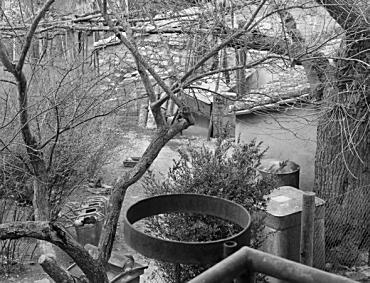
Umbrian Scene
Joel Leivick
_______________________
Open letter to conservatives
Michael Bérubé
These are tough times for everyone, but I know these are especially tough times for you. From Iraq to Katrina to this global financial meltdown, you’ve made rather a mess of things, and now your party’s standardbearer is running a historically abysmal campaign made up of one part lies and two parts hate. His proposal for health care is somewhere between stupid and vicious, and his response to the financial crisis is, amazingly, even worse. Who’s his base now? Left Behind fans and people who can get hoppin’ mad at Barack Hussein Obama for spending three million dollars on an overhead projector thingy whatsis. Yes, you have a VP candidate who got the base (and Rich Lowry) excited. But as Hunter pointed out the other day,
The wingnut base is the easiest group of people on the planet to fire up. They get fired up when they think gays might steal their marriages. They get fired up when they have to press “one” for English. They get fired up when some black guy gets all uppity and runs for president. They get fired up when their sub-sub-sub-version of Christianity isn’t the dominant religious ideal of the nation. Holding Sarah Palin in front of them is like teasing a dog through a fence, but that’s about it.
(....)
Understand, I don’t want to deprive you of your pastimes and your livelihoods. On the contrary: I want you to enjoy them to the fullest extent imaginable—but in a way that doesn’t interfere with sane people. So I have a proposal.
We will spend $500 trillion and create 150 million new, high-paying jobs creating an alternate reality for you. In a state of your choosing—but preferably Utah, Oklahoma, or Alaska—we will construct a massive VR installation complete with all your favorite obsessions and catering to your every resentment. In this separate, self-enclosed universe, President Palin and Vice-President Tancredo will run things just like you think they oughta be; crescents and croissants will be banned; An American Carol will sweep the Oscars; television will consist of two channels, Fox and Fox Sports; and the ten commandments will be proudly displayed in every classroom and courtroom, together with a Very Angry Eagle if you like. There won’t be any elite universities or sneering college professors, of course, but there will be Mexicans, so that you can call for their deportation and then hire them to mow your lawn and work in your pork-processing plants; there will be gay people, so that your sense of sexual identity can be properly threatened at all times; and there will be a black person, played by Gloria Foster, so that you can prevent her from voting. ...(more)

photo - mw
_______________________
Ten Poems from Poemas Humanos [PDF]
César Vallejo
translated by Clayton Eshleman
Janus Head
[No one lives in the house anymore…]
- No one lives in the house anymore – you tell me -; all have gone. The living room, the bedroom, the patio, are deserted. No one remains any longer, since everyone has departed.
And I say to you: When someone leaves, someone remains. The point through which a man passed, is no longer empty. The only place that is empty, with human solitude, is that through which no man has passed. New houses are deader than old ones, for their walls are of stone or steel, but not of men. A house comes into the world, not when people finish building it, but when they begin to inhabit it. A house lives only off men, like a tomb. That is why there is an irresistible resemblance between a house and a tomb. Except that the house is nourished by the life of man, while the tomb is nourished by the death of man. That is why the first is standing, while the second is laid out.
Everyone has departed from the house, in reality, but all have remained in truth. And it is not their memory that remains, but they themselves.
.....................................................
Janus Head 10.2
Special Issue
Celebrating the Life and Work of J.H. van den Berg
from the introduction [PDF]
Robert D. Romanyshyn
The articles gathered here give some idea of the influence of van den Berg’s work in phenomenology and metabletics across a wide spectrum of scholars, teachers and writers. Of course, given the range of van den Berg’s work–some thirty-three volumes–this issue presents only a small fraction of his work. Yet, the principal themes that have guided his thinking and writing
for more than half a century are on display here, and one of my hopes is that with this volume van den Berg’s work will be introduced again to teachers, writers, and students in psychology philosophy, literary studies and the arts. I also hope that this presentation of van den Berg’s work will tap into new audiences. Finally, I hope that he and his work are re-discovered by American psychology. His approach to phenomenology offers a much-needed corrective to the one-sided development of the discipline toward a narrow and reductive view of the human person. Indeed, as van den Berg himself says in the Interview with him in this volume, “I want to confess that the notion of psychology gets on my nerves,” because, as he adds, “ it fell on its knees before positivism.”
_______________________
why must itself up every of a park
anus stick some quote statue unquote to
prove that a hero equals any jerk
who was afraid to dare to answer "no"?
quote citizens unquote might otherwise
forget(to err is human;to forgive
divine)that if the quote state unquote says
"kill" killing is an act of christian love.
"Nothing" in 1944 AD
"can stand against the argument of mil
itary necessity"(generalissimo e)
and echo answers "there is no appeal
from reason"(freud)--you pays your money and
you doesn't take your choice. Ain't freedom grand
- E. E. Cummings

Edward Estlin Cummings
Oct 14, 1894 – Sept 3, 1962
1 2 3 4
the Cambridge ladies who live in furnished souls
are unbeautiful and have comfortable minds
(also, with the church's protestant blessings
daughters,unscented shapeless spirited)
they believe in Christ and Longfellow, both dead,
are invariably interested in so many things--
at the present writing one still finds
delighted fingers knitting for the is it Poles?
perhaps. While permanent faces coyly bandy
scandal of Mrs. N and Professor D
.... the Cambridge ladies do not care, above
Cambridge if sometimes in its box of
sky lavender and cornerless, the
moon rattles like a fragment of angry candy
E. E. Cummings
decapitalization of E. E. Cummings
Norman Friedman
 Bleeker Street
The Paintings of E. E. Cummings
_______________________
The Return of the Socioeconomically Repressed
ktismatics
Darian Leader wants to listen to symptoms instead of just treating them, and that’s fine. But he expects the symptoms to tell him to look inside the self for clues about their causes and their possible resolution. In this respect psychoanalysis and CBT are allies: both modalities regard the self as the source of his or her own misery. So too does neoliberalism(....)
The economic threat posed by letting psychological symptoms speak is that the symptoms will direct people's attention not deep inside themselves but outside, to socioeconomic conditions that provoke depression, anxiety, rage and alienation as natural reactions to sick situations.(....)
If we let socioeconomic symptoms speak, if we experience a collective return of the repressed, what sorts of interventions are liable to suggest themselves?
via k-punk
_______________________
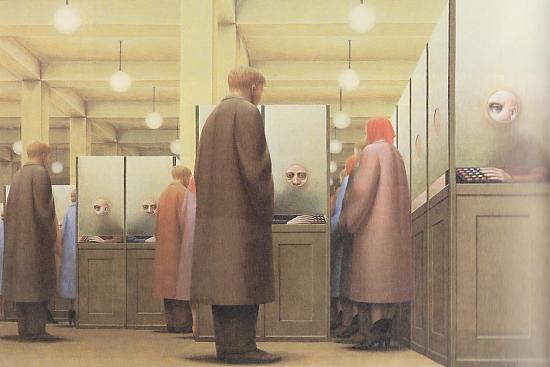
Government Bureau
George Tooker
1956
Ten Dreams Galleries _______________________
The God That Failed
The 30-Year Lie of the Market Cult
Chris Floyd
_______________________
The Class War Before Palin
David Brooks
The Republicans have alienated whole professions. Lawyers now donate to the Democratic Party over the Republican Party at 4-to-1 rates. With doctors, it’s 2-to-1. With tech executives, it’s 5-to-1. With investment bankers, it’s 2-to-1. It took talent for Republicans to lose the banking community.(....)
...politically, the G.O.P. is squeezed at both ends. The party is losing the working class by sins of omission — because it has not developed policies to address economic anxiety. It has lost the educated class by sins of commission — by telling members of that class to go away.
_______________________

Us Election 2008: Placards
Charles Bernstein
SIBILA
_______________________
The McCain-Palin Campaign: Running on Hatred & Fear
Jim Johnson
_______________________
ACORN Response to Senator McCain's Smear Ad
"For almost a decade, ACORN, a community organization of 400,000 families in neighborhoods across the country, has been fighting against the predatory lending practices that have robbed our members of their homes, destabilized neighborhoods, and roiled the global economy.
"In his newest ad, John McCain's campaign bizarrely claims, 'ACORN forced banks to issue risky home loans, the same types of loans that caused the financial crisis we're in today.' Nothing could be further from the truth. In fact, ACORN has worked successfully to help working class families get good home loans on fair terms from legitimate banks and has fought vigorously ...
via Frank Paynter.....................................................
Sen. McCain Stood With ACORN Rally In 2006
_______________________
Aggressive ignorance defiantly shoves its utter lack of knowledge in your face and brays: “Facts? We don’t need no stinkin’ facts!” Team Bush has repeatedly asserted that it didn’t need to know much of anything — about Iraq, hurricane relief, science, global climate change or the corruptions of the financial sector, and that we shouldn’t know anything about these things either.
McCain and Palin — the Dumb and Dumber ticket — have elevated aggressive ignorance to new levels. McCain, with his bone-headed assertions about the strength of the economy, not knowing Sunnis from Shiites, maintaining he hadn’t read the proposed bailout legislation he was swooping into Washington to vote on, and Sarah Palin with … well, where to start?
- Susan J. Douglas, The End of Aggressive Ignorance?
_______________________
One thousand George Bushes and one thousand Dick Cheneys will never be able to tear that house down.
"They will, however, be leaving office, dropping the national tragedies of Katrina, Iraq, and our financial crisis in our laps. Our sacred house of dreams has been abused, looted, and left in a terrible state of disrepair. It needs care; it needs saving, it needs defending against those who would sell it down the river for power or a quick buck. It needs strong arms, hearts, and minds. It needs someone with Senator Obama's understanding, temperateness, deliberativeness, maturity, compassion, toughness, and faith, to help us rebuild our house once again. But most importantly, it needs us. You and me. To build that house with the generosity that is at the heart of the American spirit. A house that is truer and big enough to contain the hopes and dreams of all of our fellow citizens. That is where our future lies. We will rise or fall as a people by our ability to accomplish this task. Now I don't know about you, but I want that dream back, I want my America back, I want my country back. Bruce Springsteen
-
_______________________
The Republican war on words.
James Wood
The once bipartisan campaign adviser Dick Morris and his wife and co-writer, Eileen McGann, argue that the McCain camp, in true Rovian fashion, is “using the Democrat’s articulateness against him” (along with his education, his popularity, his intelligence, his wife—pretty much everything but his height, though it may come to that). John McCain’s threatened cancellation of the first Presidential debate was the ultimate defiance, by action, of words; sure enough, afterward conservatives manfully disdained Barack Obama’s “book knowledge.” To have seen the mountains of Waziristan with one’s own eyes—that is everything.(....)
... the campaign that claims to loathe “just words” has proved expert at their manipulation, from reversals of policy to the outright lies of some of its attack ads (“comprehensive sex education”) and the subtle racial innuendo of a phrase like “how disrespectful” (used to accuse Obama of making uppity attacks on Palin). Karl Rove—along with predecessors like Lee Atwater and protégés like Steve Schmidt—long ago showed the Republicans that language is slippery, fluid, a river into which you can dump anything at all as long as your opponent is the one downstream. And, to be fair, those who affect to despise words have been more skillful than their opponents not just at amoral manipulation but at the creation of what Orwell called “a fresh, vivid, home-made turn of speech.” Pit bulls and lipstick stuck for good reason....(more)
_______________________
“Deliberately Feeding the Most Unhinged Elements of Our Society the Red Meat of Hate”
Frank Schaeffer, author of Crazy for God: How I Grew Up as One of the Elect, Helped Found the Religious Right, and Lived to Take All (or Almost All) of It Back.
_______________________
Oliver Cromwell
Mark Scroggins
Marsh Hawk Review
He read of children tossed
at a pike’s end, of cannons
with “God Is Love” scribed round
their barrels. He read of a snake
with garnet eyes, of golden
ringlets curling round the hemp
of a hangman’s noose.
He read of green fields
and mines, of foundries
and factory floors. Pleasures
and game diversions. The tree
which bursts into pink blossoms
of enthusiasm. The trees huddle
suspiciously in the wind, rustle
in green whispers. A village mashed
and shattered under the sun, not one
stone left upon another. Bombers
and fighter jets darkening the sun,
the shop clerk whose weekend sends
him – in militiaman’s uniform –
to take stock – with a bayonet– of a
tentful of refugees. Great men,
whose brows line with the effort
of shaping destiny. Who read old books,
and find their faces there.
Mark Scroggins blogs at Culture Industry and has recently published The Poem Of A Life: A Biography of Louis Zukofsky.
_______________________
pity this busy monster,manunkind,
not. Progress is a comfortable disease:
your victum(death and life safely beyond)
plays with the bigness of his littleness
-electrons deify one razorblade
into a mountainrange;lenses extend
unwish through curving wherewhen until unwish
returns on its unself.
A world of made
is not a world of born-pity poor flesh
and trees,poor stars and stones,but never this
fine specimen of hypermagical
ultraomnipotence. We doctors know
a hopeless case if-listen:there's a hell
of a good universe next door;let's go
- E. E. Cummings
_______________________

Corporate Decision
George Tooker
1 2

'Chuckie Saunders on load
Hugh Hill at wheel
delivering maple lumber to Goderich Organ Factory'
Reuben R. Sallows
(1855 - 1937)
_______________________
Algebra of Identity
Skin of Wind, Skin of Streams, Skin of Shadows, Skin of Vapor
D. Fox Harrell
ctheory
Wind whips, shrieks, or is unnoticeable. Streams bears small creatures below rocks, rush with energy and transparency. Shadow obscures, cools, relaxes. Vapor moistens, hides, causes ships to crash, is fluid but hangs in the ether. If we can imagine these four skins, we can also imagine skin of tangled roots, illicit love, unscratched itches, crossed senses, angels, or demons. I shall get back to this later.
What I wish to conjure is a sense of the fleeting nature and contingency of classification based identity as it is typically conceived of. I propose why some current notions of identity seem damaging, and discuss alternative ways to address it. My belief is in internalizing and exposing this very contingency, accepting this as the reality in how we perceive ourselves, others, and the concept of identity as a whole. ...(more)
_______________________
Poetry and Stupidity
K. Silem Mohammad
Visualize Emily Dickinson's famous quote about good poetry being that which takes the top of your head off. We're basically talking about a lobotomy here, or a shotgun accident. Note that she never says anything about putting the top back on....(more)
_______________________

Derek McCrea
Dark Sky Magazine
_______________________
Marsh Hawk Review
an online poetry journal sponsored by the Marsh Hawk Press collective.
_______________________

Subhankar Banerjee
Arctic National Wildlife Refuge
Subhankar Banerjee, Peter Matthiessen et.al.
google books Seasons of Life and Land
Photographs of the Arctic National Wildlife Refuge
Subhankar Banerjee _______________________
The Toxic Cynicisms of Amnesiacs: “Drill, Baby, Drill” and “Never Again!”
Stephen Lewis
Hak Pak Sak
_______________________
Big Thinking: Milan Kundera and Image
Jamelah Earle
Literary Kicks
As we in the United States are now in the thick of election season, busily being bombarded by message after message, I thought it was fitting to pull out one of Kundera’s digressions (in Immortality), about reality, ideology and image.(....)
Of course, imagologues existed long before they created the powerful institutions we know today. Even Hitler had his personal imagologue, who used to stand in front of him and patiently demonstrate the gestures to be made during speeches to fascinate the crowds. But if that imagologue, in an interview with the press, had amused the Germans by describing Hitler as incapable of moving his hands, he would not have survived his indiscretion by more than a few hours. Nowadays, however, the imagologue not only does not try to hide his activity, but often even speaks for his politician clients, explains to the public what he taught them to do or not to do, how he told them to behave, what formula they are likely to use, and what tie they are likely to wear. We needn’t be surprised by this self-confidence: in the last few decades, imagology has gained a historic victory over ideology.(....)
Public opinion polls are the critical instrument of imagology’s power, because they enable imagology to live in absolute harmony with the people. The imagologue bombards people with questions: how is the French economy prospering? is there racism in France? is racism good or bad? who is the greatest writer of all time? is Hungary in Europe or Polynesia? which world politician is the sexiest? And since for contemporary man reality is a continent visited less and less often and, besides, justifiably disliked, the findings of polls have become the truth. Public opinion polls are a parliament in permanent session, whose function is to create truth, the most democratic truth that has ever existed. Because it will never be at variance with the parliament of truth, the power of imagologues will always live in truth, and although I know that everything human is mortal, I cannot imagine anything that could break this power.
This bit about public opinion polls is especially timely, considering the fact that in the final run-up to the election, more and more of these so-called undecided voters (who are these people, exactly? I don’t know any of them) will be polled this way and that way to see what they’re thinking, to try to decipher in whose direction these votes will break. People are broken down into stereotypes so they can be spoken of in neat soundbites. We have Hockey Mom and Soccer Mom and Joe Six-Pack (which I’m assuming is not a comment on his killer abs) and we’re white collar and blue collar and down-home folks and coastal elitists and blah blah blabbity blah and the news is so full of talk about what this group believes and what that group believes that we don’t even really need to talk to each other anymore, eh?...(more)
_______________________

Broken eggs
Reuben R. Sallows
1911
_______________________
The money changers have fled from their high seats in the temple of our civilization. We may now restore that temple to the ancient truths. The measure of the restoration lies in the extent to which we apply social values more noble than mere monetary profit.
- Franklin D. Roosevelt March 4, 1933
_______________________
Lenny Bruce had an incurable disease. He saw through the pretense, hypocrisy, and paradoxes of our society. All he insisted on was that we meet it straight ahead and not cop out or lie about it. "If something about the human body disgusts you," he said, "complain to the manufacturer." He was one of those who, in Hebbel's expression, "have disturbed the world's sleep." And he could not be forgiven .
- Ralph J. Gleason

Lenny Bruce
October 13, 1925 – August 3, 1966
photo - Sid Tate
Lenny Bruce is dead but he didn't commit any crime
He just had the insight to rip off the lid before its time.
I rode with him in a taxi once, only for a mile and a half,
Seemed like it took a couple of months.
Lenny Bruce moved on and like the ones that killed him, gone.
They said that he was sick 'cause he didn't play by the rules
He just showed the wise men of his day to be nothing more than fools.
They stamped him and they labeled him like they do with pants and shirts,
He fought a war on a battlefield where every victory hurts.
Lenny Bruce was bad, he was the brother that you never had.
- Bob Dylan, Lenny Bruce
_______________________
Does the free market corrode moral character?
We'd rather not know.
Robert B. Reich
Most of us are consumers who try to get the best possible deals in the market. Most of us are also moral beings who try to do the right things in our communities and societies. Unfortunately, our market desires often conflict with our moral commitments. So how do we cope with this conflict? All too often, we avoid it. We would rather the decisions we make as consumers not reflect upon our moral characters. That way we don't have to make uncomfortable choices between the products and services we want and the ideals to which we aspire.(....)
The market does not corrode our character. Rather, ... it enables us to shield ourselves from any true test of our character. It thereby allows us to retain our moral ideals even when our market choices generate outcomes that would otherwise violate them.
If the market mechanism were so transparent that we could not avoid knowing the moral effects of our buying decisions, presumably we would then have to choose either to sacrifice some material comforts for the sake of our ideals or to sacrifice those ideals in order to have the comforts. That would be a true test. Absent such transparency, we don't need to sacrifice either. We can get the great deals and simultaneously retain our moral scruples without breaking a sweat....(more)
_______________________
k-punk on Barbara Ehrenreich's How Positive Thinking Wrecked the Econom
If the magical thinking that Enherenreich decries cannot be considered only delusional, it's because, in the markets, it's not possible to separate out beliefs from their objects. Beliefs don't register the true or falsity of propositions; rather, in the classic hyperstitional self-fulfilling loop, beliefs themselves determine value (and its destruction, as this meta-warning in The Economist points out). "Realism" isn't an available orientation. Moreover, the loop works both ways: as Robert Shiller pointed out in Irrational Exuberance, booms produce the euphoric psychological states necessary for their own maintenance....(more)
_______________________

Reuben R. Sallows
Date 1910
_______________________
Aristotle’s Ghost
Kurt Schwenk
Why do the differences among us lead to ridicule, to sneering, even to hate? Is prejudice inevitable? There seems to be a kind of terrible logic operating here, a hateful syllogism: People are different; differences create prejudice; people are prejudiced. As a scientist, an evolutionary biologist, I worry that it could be the way we are made, a hard-wired trap. At the same time, I am only too aware of how culture and the history of ideas shape our thoughts even before they are consciously manifested. Patterns of thought, and therefore attitudes, seem to develop in the mind along paths of least resistance. The paths become rutted with use and increasingly hard to escape. They may be more learned than evolved, and so I wonder about the history of ideas about diversity. Could the way we think about the diversity of life in the broadest sense provide clues to the nature of human prejudice? Is Aristotle to blame?...(more)
Wild River Review
_______________________
Language Poetry and the Body
Moderated by Erica Kaufman and Tim Peterson
Maria Damon
Steve Benson
Leslie Scalapino
Bruce Andrews
_______________________
End of Summer
An agitation of the air,
A perturbation of the light
Admonished me the unloved year
Would turn on its hinge that night.
I stood in the disenchanted field
Amid the stubble and the stones,
Amazed, while a small worm lisped to me
The song of my marrow-bones.
Blue poured into summer blue,
A hawk broke from his cloudless tower,
the roof of the silo blazed, and I knew
that part of my life was over.
Already the iron door of the north
Clangs open: birds, leaves, snows
Order their population forth,
And a cruel wind blows.
- Stanley Kunitz
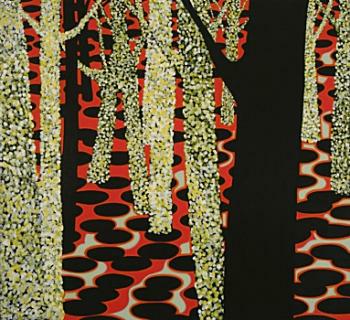
Michael Aaron Lee
An image paired by Maud Newton with Nathaniel Hawthorne's Young Goodman Brown
(a suitably witchy tale for this pre-election pre-halloween nightmare time - mw)
_______________________
Daniel Hahn's translation blog
translating Estação das Chuvas by José Eduardo
In this blog I hope to examine the translation process, working through a novel from my own first launching into a first draft, right up to publication. It's not a blog about the life of a translator - musings about translation generally, reports of events I've attended or readings I've given, people I've met at launch parties, books I've read - but intimately about a single piece of translation work, which I hope will bring you closer to the experience, to the pleasures it brings and the questions it raises.
Booktrust Translated Fiction
_______________________
All identity spent
one can live
in the neutrality
of the empty pine cone
unaware of the waiting fire.
It will perhaps wait day after day
ignorant of its own being.
(translation by JF & LM)

Eugenio Montale
October 12, 1896—September 12, 1981
photo by Ugo Mulas
I have written poems and for this I have been awarded a prize. But I have also been a librarian, translator, literary and musical critic and even unemployed because of recognized insufficiency of loyalty to a regime which I could not love. A few days ago a foreign journalist came to visit me and she asked me, "How did you distribute so many different activities? So many hours for poetry, so many hours for translation, so many for clerical activity and so many for life?" I tried to explain to her that it is to plan a lifetime as one plans an industrial project. In the world there is a large space for the useless, and indeed one of the dangers of our time is that mechandizing of the useless to which the very young are particularly sensitive.
Is Poetry Still Possible?
Nobel Lecture, December 12, 1975
Eugenio Montale: Ascending [PDF]
Robert Bly New York Times Nov 9, 1975
Xenia I
Eugenio Montale
translated from the Italian by William Arrowsmith
AGNI
A Reading of the life and works of Eugenio Montale
Lorenzo Matteoli
Translation edited by: Jody Fitzhardinge .....................................................
Maybe one morning walking in air
of dry glass, I'll turn and see the miracle occur -
nothingness at my shoulders, the void
behind me - with a drunkard's terror.
Then, as on a screen, the usual illusion:
hills houses trees will suddenly reassemble,
but too late, and I'll quietly go my way,
with my secret, among men who don't look back.
(translation by William Arrowsmith)
_______________________
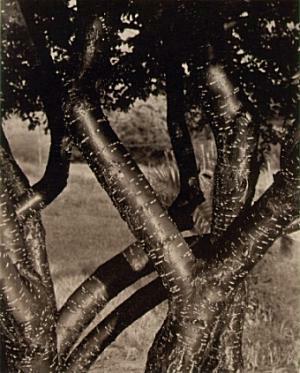
Dancing Trees
Alfred Stieglitz
1922
_______________________
Raymond Federman - An Inner-View
by David Moscovich
rain taxi
Beckett is always present in my work. Always an echo. He helps me invent the stories of my life.
There is a woman in Portugal writing her doctoral dissertation about me in French. Beautiful French. She says the difference between me and other writers is that other writers go into the past to retrieve memories, me I invent memories and then go into the past to verify them. But they never click because things have changed.
The other day, my wife said to me, you are lucky Beckett fell on you. Because if you had written your doctoral dissertation on Emile Zola or Balzac, you would have remained a little French professor somewhere. Beckett took me out of the imposture of realism and naturalism. ...(more)

Greek Tablets
Wady Kardassy- Nubia
ca. 1857
Francis Frith
_______________________
from
The Camps
Hayden Carruth
He who is writing these words, an old man
on an undistinguished hillside
in North America
who has been writing for sixty years because this
is his way of being in the world, writing
on scraps of paper with stubby pencils
or on cheap tablets from the drug store, on a battered typewriter
set on an orange crate in a roach-ridden flat
in Chicago or in a small country house
on a computer, writing
all his life long
in the desert, on the mountain, in the forest,
on a beautiful boulder standing in the middle of a mountain brook,
writing,
writing year after year the way robins
build their nests…
What if these were his last words?
What if these sentences should be the vision at the end
of a lifetime he could never alter?
* * *
Sing then of love
in the camps. Somebody
gives somebody else
a swallow of water.
People hold hands,
a woman cuddles her
baby as long as
she can. Men in the face
of the sweeping automatic
rifles against the wall
embrace just before
the blast. And does it
help? Ah how ardent
the hope has been! But
no one knows, the evidence
has vanished. Day Twenty-Two
PoetryPolitic: A Blog in 50 Days
_______________________
I’m reading plenty of people now who seem to me so much more deranged, more out-of-their-skulls batshit crazy than the most fringe puppet-waving no-blood-for-oil-sign-waver you could possibly conjure up after a night of watching Fox News in a drunken stupor. So. Seriously, don’t mention “Bush Derangement Syndrome” around me any more, because whatever your yardstick is, if you’re not adding another three or four yards to it right now, you’re either not paying attention or you’re one of the lotus-eaters.
- Timothy Burke
_______________________
Common-place
VOL. 09 · NO. 01 · October 2008
Beyond the Valley of the Founders
Democracy in Early America, and Beyond
.....................................................
The layout of a voting machine harbors implications about meaning, about what is and what is important, and therefore harbors politics in its broadest sense.
Voting Machines and the Voters They Represent
Technology and democratic intent Lisa Gitelman common-place
Very few patented voting machines were ever built or used. Their inventors were truly theorists, theorizing in metal and other materials as they proposed and patented what they thought was a better democratic future, a better version of voting. Successive voting machines for the most part have harbored a reform, Mugwump, or Progressive ideology, with its generous helping of what might be termed technoblesse oblige: The right machine saves the voter from error and the state from confusion. In this sense, the built-in bias of voting machines is less politically partisan than it is culturally political, adapted to the contexts of "normal" voting in any historical moment. Machines represent the normal voter, and, if implemented, help that voter to represent her or his will.
It remains to note in conclusion that no theory remains unmoved by practice. Like all representations, voting machines are non-static; their meanings arise in part from their reception and use, not just from the authorial intentions of their patent-holding inventors and manufacturers. Thomas Edison may have meant one thing by his voting machine in 1869, for example, but today that same machine means something else. Likewise, John Ahmann’s invention represents a stylus-wielding, chad-punching voter. In retrospect, it also represents a voter who is a bit more likely to be African American than not, since those were the hands that held the stylus, according to a New York Times survey of Florida precincts and their equipment. James Baker III was correct; machines are neither Republicans nor Democrats, when they are invented by people like Ahmann or adopted by states like Florida. Only in use was the VotoMatic so emphatically a Republican machine, when its inventor testified for the Republicans in court and when its relatively high rate of residual votes or undercounts (combined with confusing ballot design in several counties) helped George W. Bush to win the 2000 election....(more)
.....................................................
When Johnny Comes Marching Home…from the Bank
War and finances in America, from the U.S.-Mexican War to the present
Max M. Edling _______________________

Still Life: Window
1938
One Third of a Nation
Arnold Eagle and David Robbins
The New Deal Network
_______________________
The Globalization Gamble: The Dollar-Wall [PDF]
Street Regime and its Consequences
Peter Gowan
via Stan Goff
_______________________
So There Is Money that Could Have Helped Schools
Jesse Hagopian
The secret is out.
Like a note confiscated by the teacher and read aloud to the class, there can no longer be any doubt about the message being sent.
With the passage of the bailout bill for Wall Street, everyone now knows that the government can come up with a gazillion dollars (I’m not a math teacher, but I believe that is the approximate sum) to address a national problem if it’s deemed serious enough.
Being a social studies teacher, I’ll give you a simple quiz to assess your comprehension of the Wall Street giveaway. This means either:
A) Before this bailout, we haven’t had any serious problems in America that would require a massive spending initiative.
B) Government had the capacity all along to address any of the major crises in America with the needed funds, but has refused to do so.
...(more)
_______________________
The Hardest Vote
The disaffection of Ohio's working class.
George Packer
When will the class war ever finally drown out the culture war, if not in 2008? ...(more)
_______________________
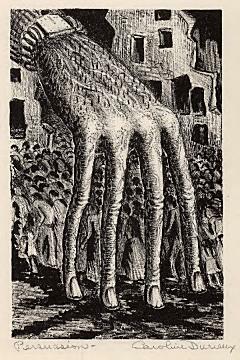 Persuasion
1947
Caroline Durieux
(1896-1989)
featured at BibliOdyssey
_______________________
Against Diversity
Walter Benn Michaels
New Left Review
The US today is certainly a less discriminatory society than it was before the Civil Rights movement and the rise of feminism; but it is not a more just, open and equal society. On the contrary: it is no more just, it is less open and it is much less equal.(....)
...virtually all the growth in inequality has taken place since the passage of the Civil Rights Act of 1965—which means not only that the successes of the struggle against discrimination have failed to alleviate inequality, but that they have been compatible with a radical expansion of it. Indeed, they have helped to enable the increasing gulf between rich and poor.
Why? Because it is exploitation, not discrimination, that is the primary producer of inequality today. It is neoliberalism, not racism or sexism (or homophobia or ageism) that creates the inequalities that matter most in American society; racism and sexism are just sorting devices. In fact, one of the great discoveries of neoliberalism is that they are not very efficient sorting devices, economically speaking.
(....)
This is also why the real (albeit very partial) victories over racism and sexism represented by the Clinton and Obama campaigns are not victories over neoliberalism but victories for neoliberalism: victories for a commitment to justice that has no argument with inequality as long as its beneficiaries are as racially and sexually diverse as its victims. That is the meaning of phrases like the ‘glass ceiling’ and of every statistic showing how women make less than men or African-Americans less than whites. It is not that the statistics are false; it is that making these markers the privileged object of grievance entails thinking that, if only more women could crash through the glass ceiling and earn the kind of money rich men make, or if only blacks were as well paid as whites, America would be closer to a just society.
It is the increasing gap between rich and poor that constitutes the inequality, and rearranging the race and gender of those who succeed leaves that gap untouched. ...(more)
via American Leftist
_______________________
Finally, an optimistic note. I was reminded yesterday that the vast bulk of “wealth” created during the Greenspan/Bernanke bubble years accrued to the very top percentiles of population – with many in the OECD middle class and lower class either stagnating or getting poorer as they mired themselves in unsustainable debt. While opportunity and employment grew strongly in emerging countries, there too the elites gained disproportionately as income inequalities surged. The crash of global financial markets therefore will have disproportionate effect on the elites, impoverishing them to a far greater extent, although it will be felt throughout society as employment, pensions, investments and public services contract.
Once we hit bottom of this downturn, some years hence in all probability, we may experience a democratisation of wealth and opportunity like none seen since the end of World War II when education reforms and unionisation laid the groundwork for the rise of the American and OECD middle classes. Those who have lost economic and political power during the boom years, are likely to organise and retake authority within economic and political systems during the bust years. This could provide reorientation of economic progress toward more equitable, sustainable and democratic outcomes in coming generations. I hope so, it’s the only bright spot of the week.
-
RGE Monitor
_______________________
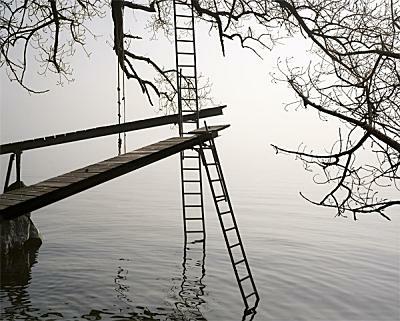
deux échelles
disparitions series
Mathieu Bernard-Reymond
_______________________
May I Not Seem to Have Lived
Joseph Cardinale
conjunctions
I stare at the star, runs the conservative translation. And yet this translation ignores the potential that we might read the noun, starum, as an objective form of the verb, stareo, in which case the translation would go something like: I stare at the act of staring, or, I contemplate contemplation. The matter becomes further complicated in light of other and less literal interpretations, such as that the poet might have been writing from the perspective of the star, or that the word starus was often used during the first century after the birth of Christ (and the death of Selenus) as slang for infinity. And so we find that from one line of poetry written more than two thousand years ago a seemingly endless line of potential meanings emerge:
1. I star the star.
2. I contemplate infinity.
3. I am a star, staring at myself.
4. I can’t stop staring.
5. I am infinitely stared at.
6. The star lasts as long as I stare at it.
7. I stare forever.
8. I immortalize the star.
To insist that one translation is right and the rest are wrong is of course to miss the point, said the Instructor. The point is simply that the line between what you are and what you’re observing is erasable—that if you stare at an object all the way and without limitation you are no longer anything else. You’re everything. ...(more)
_______________________

Ricardo Villalba
(attributed)
ca. 1875
An Even Greater Measure
George Eastman House
_______________________
Man shouldn't be able to see his own face - there's nothing more sinister. Nature gave him the gift of not being able to see it, and of not being able to stare into his own eyes.
Only in the water of rivers and ponds could he look at his face. And the very posture he had to assume was symbolic. He had to bend over, stoop down, to commit the ignominy of beholding himself.
The inventor of the mirror poisoned the human heart.
-
Pessoa, The Book of Disquiet

photo - mw
After a trip to the eye doctor I stopped by Remic Rapids and was fortunate in finding John-Félice Ceprano at his semi-perpetual labours - mw
"THE PURSUIT OF BALANCE" is the art of balancing natural, unaltered rocks to create temporal, freestanding rock sculptures. The process is determined by trusting that nature will provide whatever is necessary. Furthermore, the sculptures are created entirely by hand and no equipment is involved.
The Remic Rapids project, located in downtown Ottawa, began in 1986. The work begins each summer season when the Ottawa River recedes, allowing safe access to the rocks on the riverbed, and continues through the summer into late fall, when rising river currents and ice naturally dismantle the sculptures.
- John-Félice Ceprano
Ceprano Rock Arts
Ottawa Remic Rapids Park
youtube
_______________________
Nick Piombino on Issue #1 Faux Anthology
People have been saying that we are in a time warp in that in New York now, that we are in a repeat of the Weimar era. Maybe this Godot thing is our cabaret- rude, crude, risque, funny, a little dark, with music by Kurt Weill and a set by Kirchner, Grosz or Hannah Hoch. I had even written in the comment section of Issue 1, "There has been talk of a poetry bailout. Is this it?" It looks like the powers that be are plotting to send the whole batch of us poets and day workers out onto the streets as in *The Threepenny Opera* while "citibank" robs everybody blind. And then we'll listen to the barrel organ sound, in the city while the sun sinks low.
_______________________
Exorcising Beckett
Lawrence Shainberg
The Paris Review, Fall 1987
Something else he said that first night in London was familiar to me from one of his published interviews, but he said this, too, as if he'd just come upon it and hearing it now I felt that I understood for the first time that aspect of his work which interested me the most. I'm speaking of its intimacy and immediacy, the uncanny sense that he's writing not only in a literary but an existential present tense, or more precisely, as John Pilling calls it in his book Samuel Beckett, an imperfect tense. The present tense of course is no rare phenomenon in modern, or for that matter, classical fiction, but unlike most writers who write in the present, Beckett writes from the present and remains constantly vulnerable to it. It is a difference of which he is acutely aware, one which distinguishes him even from a writer he admires as much as he does Kafka. As he said in a 1961 interview, "Kafka's form is classic, it goes on like a steamroller, almost serene. It seems to be threatened all the time, but the consternation is in the form. In my work there is consternation behind the form, not in the form." It is for this reason that Beckett himself is present in his work to a degree that, as I see it, no other writer managed before him. In most of his published conversations, especially when he was younger and not (as later) embarrassed to speak didactically, he takes the position that such exposure is central to the work that he considers interesting. "If anything new and exciting is going on today, it is the attempt to let Being into art." As he began to evolve a means by which to accommodate such belief he made us realize not only the degree to which Being had been kept out of art but why it had been kept out, how such exclusion is, even now, the raison d'etre of most art and how the game changes, the stakes rising exponentially, once we let it in. Invaded by real time, narrative time acquires an energy and a fragility and, not incidentally, a truth which undermines whatever complacency or passivity the reader — not to mention the writer — has brought to the work, the assumption that enduring forms are to be offered, that certain propositions will rise above the flux, that "pain-killers," which Hamm seeks in vain throughout Endgame, will be provided. In effect, the narrative illusion is no longer safe from the narrator's reality. "Being," as he said once, "is constantly putting form in danger," and the essence of his work is its willingness to risk such danger. Listen to the danger he risks in this sentence from Molloy: "A and C I never saw again. But perhaps I shall see them again. But shall I be able to recognize them? And am I sure I never saw them again?"(....)
Molloy and his creator are joined from the first, and the latter — unlike most of his colleagues who have been taught, even if they're writing about their own ignorance and uncertainty, that the strength of their work consists in their ability to say the opposite — is saying "I don't know" with every word he utters. The whole of the narrative is therefore time-dependent, neurologically and psychologically suspect and contingent on the movement of the narrator's mind. And since knowledge, by definition, requires a subject and an object, a knower and a known, two points separated on the temporal continuum, Beckett's "I don't know" has short circuited the fundamental dualism upon which all narrative, and for that matter, all language, has before him been constructed. If the two points cannot be separated on the continuum, what is left? No time, only the present tense. And if you must speak at this instant, using words which are by definition object-dependent, how do you do so? Finally, what is left to know if knowledge itself has been, at its very root, discredited? Without an object, what will words describe or subjugate? If subject and object are joined, how can there be hope or memory or order? What is hoped for, what is remembered, what is ordered? What is Self if knower and known are not separated by self-consciousness?
Those are the questions that Beckett has dealt with throughout his life. And before we call them esoteric or obtuse, esthetic, philosophical or literary, we'd do well to remember that they're not much different from the questions many of us consider, consciously or not, in the course of an ordinary unhysterical day, the questions which, before Molloy and his successors, had been excluded, at least on the surface, from most of the books we read. As Beckett wrote once to Alan Schneider, "The confusion is not my invention ... It is all around us and our only chance is to let it in. The only chance of renovation is to open our eyes and see the mess ... There will be a new form, and ... this form will be of such a type that it admits the chaos and does not try to say that it is really something else."...(more)
via Stephen Mitchelmore
_______________________
 photo - Andrew Moore
Jay Walker's Library
Steven Levy
http://www.wired.com/techbiz/people/magazine/16-10/ff_walker?currentPage=all
Nothing quite prepares you for the culture shock of Jay Walker's library. You exit the austere parlor of his New England home and pass through a hallway into the bibliographic equivalent of a Disney ride. Stuffed with landmark tomes and eye-grabbing historical objects—on the walls, on tables, standing on the floor—the room occupies about 3,600 square feet on three mazelike levels. Is that a Sputnik? (Yes.) Hey, those books appear to be bound in rubies. (They are.) That edition of Chaucer ... is it a Kelmscott? (Natch.) Gee, that chandelier looks like the one in the James Bond flick Die Another Day. (Because it is.) No matter where you turn in this ziggurat, another treasure beckons you—a 1665 Bills of Mortality chronicle of London (you can track plague fatalities by week), the instruction manual for the Saturn V rocket (which launched the Apollo 11 capsule to the moon), a framed napkin from 1943 on which Franklin D. Roosevelt outlined his plan to win World War II. In no time, your mind is stretched like hot taffy....(more)
_______________________
Door
Birhan Keskin
Translated from the Turkish by George Messo
words without borders
Pass through me, I'll remain, I'll wait, pass through me,
but where you pass through me I cannot know.
I was told, there's a ripe fruit behind the curtain of patience,
the world will teach you both patience, and the ripe fruit's taste.
They said, you waited like these trees, a vision like these trees,
sorrowful like these trees.
I was opened, I was closed, opened, closed, I saw
those who went as much as those who came,
where is the end of patience, where the grief-stricken ass,
where the audacious fruit,
where is the garden?
...(more)
_______________________
Radical Anthropology
Issue 2 [PDF]
The Scarcity Myth - Interview with Noam Chomsky - Lionel Sims Decodes Stonehenge
Issue 1 [PDF]
Reclaim the Future! - Religion as Spectacle - Darwinist Family Values
The Radical Anthropology Group
via ReadySteadyBlog
_______________________
Ah, there is nothing so fine as comments sections. The NYT and the Washington Post have been filling up with indignant comments since Paulsen’s Wall Street Cargo Cult plan – (buy holy objects, wait until spirit appears, sell again) – shocked the complacent American householder. And, surprisingly, from shore to shore, they’ve been hardworkin’ savin’, scrimpin’ and so squeakily virtuous that heaven looks down in envy! Who would have guessed? All the time I thought it was the householders that elected Bush twice, looked on with bloodlust and shiteating grins as we invaded Iraq, took out 800 billion dollars in home loan equity, and watched with greed and no inclination to question as housing prices became the little guy’s stockmarket – bound to go up! Are these the same people who resided in a country most known, for the last eight years, for its trade deficits and its charming deal with China – buy our T-notes and we will buy your bloodspeckled plastic toys! I musta been livin’ in the wrong country.
- Limited, Inc.
_______________________
National Debt Too Large Under Bush to Fit on National Debt Clock
Brave New Films blog
Less than a month before the 2008 Presidential election, the massive Wall Street bailout due to the economic collapse under President George W. Bush has forced the owners of the National Debt Clock to add a digit.
Keep in mind that ONLY Republican Presidents have added to the debt since 1979.
_______________________
Infrastructure of Work and Society: Five Failed American Axioms
Stephen Lewis
Hak Pak Sak
2. “The Middle Class”
Both presidential candidates talks of helping the “middle class” but neither say a word about helping the working class or the poor. Avoidance of the term “working-class” is part-and-parcel of America’s pathological fear of “socialism.” It also belies the harsh reality that social mobility in America has been on the downturn since the 1950s. Not speaking of the poor is either callousness, blindness, or the abandonment of the the tradition of the party of FDR and LBJ (let alone the parties of Debs and or even LaFollette).
5. “Business is better than government”
This is the mother-of-all failed axioms, especially in the month when America’s iconic giant businesses turn to the government for bailouts. During the last debate McCain trotted our this worn chestnut to denigrate Obama’s moderate health-care proposals.
This brings us full circle. Universal health care is one of the features of European social infrastructure that ensures productivity by keeping workers health high and stress low. An important question for Americans is whether health insurance should be viewed as a luxury as it is now, a commodity as McCain proposes, or an essential aspect of social infrastructure as Obama proposes in part. The answer is not just a function of ones morality but of ones method of accounting. If one takes a longer and broader view, money invested in infrastructure — i.e. those physical and intangible systems and processes on which the social and economic life of our world depends — pays off in macro terms even if developed or delivered at short-term loss. The consensual nature of government and its operation beyond enterprise-level constraints of profit and loss make government the ideal provider or prime-mover. In fact, the provision and maintenance of infrastructure might be at the very essence of what government always has been, is, and should be....(more)
_______________________
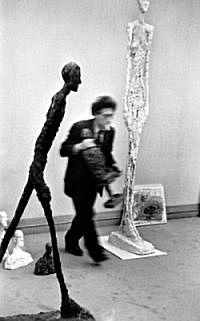
Alberto Giacometti
10 October 1901 - 11 January 1966
photo by Henri Cartier - Bresson
_______________________
The Trojan Horses of Our Demise
Gary Corseri
The Trojan horses of our demise: ignorance, arrogance, violence and greed. If we seek analogies for our financial collapse, Trojan horses are more instructive than horsemen of the apocalypse. The latter may be useful to the Fundies with their tiresome end-time fantasies. The horsemen externalize evil; they are children’s boogeymen, writ large in adult type, to frighten adult minds that should know better but cling to victimhood. Trojan horses, instead, internalize dangers—from the assassins crouching within their wooden hulls; to the gullible celebrants taking them into their fortress-city. In our blame-game culture, where and how we affix blame now is crucial to any possible restitution, let alone redemption. The glass is neither half-full nor half-empty; it is a looking-glass through which we may know ourselves....(more)
_______________________
 Remic Rapids
Ottawa
photo - mw _______________________
Scripting the Sublime:
Temporality in Beckett's 'Krapp’s Last Tape' and 'That Time'
John Tinnell
Ever since Martin Esslin published The Theatre of the Absurd, scholars have customarily linked Samuel Beckett’s dramatic oeuvre with absurdist theatre. As a result, the stylistic achievement (more sublime than absurd) of Beckett’s later script entitled That Time has received little scholarly attention. Harold Clurman typifies the mass of critical treatment as he refers to That Time as a “replay” of Beckett’s Krapp’s Last Tape. Both scripts can be performed within twenty minutes and each features an elderly male character who listens to voices in solitude. In Krapp, the source of the voice is explicitly the man’s (Krapp) own as he has recorded it over the previous years of his life. That Time, on the other hand, scripts three voices without explicating their sources. The situation centralizes the disruptive indeterminacy of the “noise” in The Cherry Orchard. Consequently, a comparative analysis of the two Beckett pieces should show Krapp as fundamentally absurdist because it is “fixed” where That Time retains a sense of indeterminacy characteristic to the sublime. Moreover, Beckett’s scripts extend our inquiry of performance within text into the ideological arena of time/identity/language which acquires polarity as we pass from the earlier script to the latter.(....)
In That Time, Beckett suffuses the text with the sublime, thus encouraging his reader to perform within or against the confining awareness of time/identity/language that exuded detachment in Krapp. Starting at the script’s title, indeterminacy pervades That Time, for even a reader bent on solving every textual puzzle cannot demystify the three monologues, each broken up and interwoven with one another without any context save for the remarkably minimal (intended) stage image of a face suspended among darkness. Furthermore, each monologue is composed wholly without punctuation. Every line of text enlists a syntactical performance by the reader. Embedded within each passage are multiple paths of emphasis, for instance, “when you went in out of the rain always winter then always raining that time in the Portrait Gallery in off the street out of the cold and rain slipped in when no one was looking”. This indeterminate style increases the opportunity for active investment within the text as it encourages readers to separate the slew of words into coherent phrases. The act of reading necessitates an ascription of meaning, more radically than a carefully punctuated text, because the reader implicates herself, through a performance of spontaneous selection, as a structuring principal of the text....(more)
Vitalpoetics
A Journal of Critical Literary Theory
via Ron Silliman
_______________________
Sacrifice
Küçük Yskender
Translated from the Turkish by Murat Nemet-Nejat
words without borders
I bought you a lampshade today
just the tip of my mind baltimore
or an open-doored green Chevrolet,
registered a masterpiece
sacrifice is the tape you play
wayward toward the shore
all around us angelhoods, in blood cleaning
at each other's throats, hanging on each others' calls
...(more)
_______________________

Thelonious Sphere Monk
October 10, 1917–February 17, 1982
_______________________
University of Chicago Press podcast debut
Episode 1 is an interview with William Graebner, author of Patty's Got a Gun: Patricia Hearst in 1970s America. Graebner takes us back to that queasy decade of the '70s, an unstable age when an heiress could become an weapon-wielding revolutionary—and back again—in a matter of months.
_______________________
Is There a Doctor in the House?
Lianne Habinek
open letters monthly
Let me suggest that Hamlet takes as a model for the unfolding of its events not only Senecan revenge tragedies, not only Saxo Grammaticus’ legend of Amleth, not (even) only the mysterious hypothesized Ur-Hamlet (a precursor to Shakespeare’s version which every academic, deep down, dreams of uncovering) – not even simply these, which have been well established as forerunners in literary critical tradition. No, let me suggest that another model for Hamlet comes from something I would call early modern neuroforensics. That is: we have seen how important were Galen’s contributions to the experimental methods of modern neuroscience. Could the notion of the lesion study have a home in Hamlet?
It is not so much a question of whether Shakespeare read the various medical texts in the Galenic tradition that were circulating at the time – influence needn’t be specific to be tangible. Rather, I think the ideas of investigation and experimentation, and, more so, the theory behind the lesion study, were circulating among the literary class in the early modern period. After all, the barriers we’ve since erected between science and art were far more fluid, more porous, then: a student studying to receive a medical degree would be trained not only in anatomy, surgery, and rudimentary chemistry, but also in rhetoric, history, and Classical literature....(more)
Open Letters Monthly
October 2008
_______________________

John-Félice Ceprano at work
photo - mw
_______________________

photo - mw
_______________________
Dismantling the House
Stephen Dunn
Rent a flatbed with a winch.
With the right leverage
anything can be hoisted, driven off.
Or the man with a Bobcat comes in,
then the hauler with his enormous truck.
A leveler or a lawyer does the rest;
experts always are willing to help.
The structure was old, rotten in spots.
Hadn't it already begun to implode?
Believe you've just sped the process up.
Photographs, toys, the things that break
your heart—let's trust
they would have been removed,
perhaps are safe with the children
who soon will have children of their own.
It's over. It's time for loss to build
its tower in the yard where you
are merely a spectator now.
Admit you'd like to find something
discarded or damaged, even gone,
and lift it back into the world.
Yesterday I was sent off in Dunn's directions by Loren Webster's reading of "Parable Of The Fictionist"

Stephen Dunn
Stephen Dunn - Poems and Biography
Three Poems Excerpted from Different Hours
Walking Light: Memoirs and Essays on Poetry
Stephen Dunn
reviewed by Robert Miltner
Electronic Poetry Review
_______________________
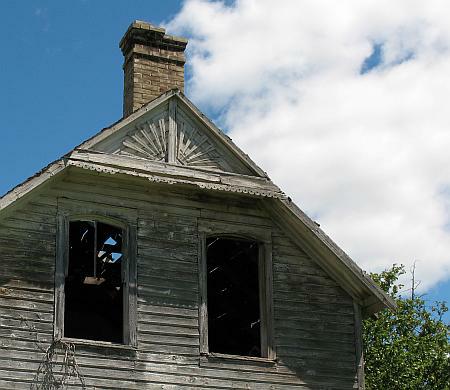
photo - mw
_______________________
Landscape at the End of the Century
Stephen Dunn
The sky in the trees, the trees mixed up
with what's left of heaven, nearby a patch
of daffodils rooted down
where dirt and stones comprise a kind
of night, unmetaphysical, cool as a skeptic's
final sentence. What this scene needs
is a nude absentmindedly sunning herself
on a large rock, thinks the man fed up
with nature, or perhaps a lost tiger,
the maximum amount of wildness a landscape
can bear, but the man knows and fears
his history of tampering with everything,
and besides to anyone who might see him
he's just a figure in a clearing
in a forest in a universe
that is as random as desire itself,
his desire in particular, so much going on
with and without him, moles humping up
the ground near the daffodils, a mockingbird
publishing its cacaphonous anthology,
and those little Calvinists, the ants,
making it all the more difficult
for a person in America
to close his office, skip to the beach.
But what this scene needs are wisteria
and persimmons, thinks the woman
sunning herself absentmindedly on the rock,
a few magnificent words that one
might want to eat if one were a lover
of words, the hell with first principles,
the noon sun on my body, tempered
by a breeze that cannot be doubted.
And as she thinks, she who exists
only in the man's mind, a deer grazes
beyond their knowing, a deer tick riding
its back, and in the gifted air
mosquitos, dragonflies, and tattered
mute angels no one has called upon in years.
Stephen Dunn at Norton Poets Online
_______________________
The Mystification of Experience
R.D.Laing
Oct 7, 1927 - Aug 23, 1989
from: "The Politics of Experience"
It is not enough to destroy one's own and other people's experience. One must overlay this devastation by a false consciousness inured, as Marcuse puts it, to its own falsity.
Exploitation must not be seen as such. It must be seen as benevolence. Persecution preferably should not need to be invalidated as the figment of a paranoid imagination; it should be experienced as kindness. Marx described mystification and showed its function in his day. Orwell's time is already with us. The colonists not only mystify the natives, in the wasy that Fanon so clearly shows, they have to mystify themselves. We in Europe and North America are the colonists, and in order to sustain our amazing images of ourselves as God's gift to the vast majority of the starving human species, we have to interiorize our violence upon ourselves and our children and to employ the rhetoric of morality to describe this process.
In order to rationalize our industrial-military complex, we have to destroy our capacity to see clearly any more what is in front of, and to imagine what is beyond, our noses. Long before a thermonuclear war can come about, we have had to lay waste to our own sanity. We begin with the children. It is imperative to catch them in time. Without the most thorough and rapid brainwashing their dirty minds would see through our dirty tricks. Children are not yet fools, but we shall turn them into imbeciles like ourselves, with high I.Q.'s, if possible.
From the moment of birth, when the Stone Age baby confronts the twentieth-century mother, the baby is subjected to those forces of violence, called love, as its mother and father, and their parents and their parents before them, have been. These forces are mainly concerned with destroying most of its potentialities, and on the whole this enterprise is successful. By the time the new human being is fifteen or so, we are left with a being like ourselves, a half-crazed creature more or less adjusted to a mad world. This is normality in our present age.
Love and violence, properly speaking, are polar opposites. Love lets the other be, but with affection and concern. Violence attempts to constrain the other's freedom, to force him to act in the way we desire, but with ultimate lack of concern, with indifference to the other's own existence or destiny.
We are effectively destroying ourselves by violence masquerading as love.
.... .....................................................
The Legacy of R. D. Laing
Janus Head Special Issue
Spring 2001
_______________________
Gil J. Wolman
film-maker, writer, political activist
7 Oct., 1929 - 3 July 1995
Wolman's aesthetic innovations, films like Atochrone, which reversed the cinematic process by breaking up a second into 24 parts, or "Megapneumie", a sort of organic noise music, and his researches into new forms of painting such as the canvas HHHHHH, were part of a radical change in the arts, which, if dated and tamed by half a century, were vital to the spirit of post-war Europe.
More important were Wolman's collaborations with Debord, including the seminal "derives" throughout Paris, walks that laid bare the "psycho-geographic" structure of the city. The Lettristes were much concerned with the nature of urban life, especially the detrimental effects of town planning, which they saw as an assault on the erotic and criminal vitality of the metropolis. At a time when progressive artists were supposedly committed to the "modern", Wolman published open attacks on Corbusier and his "Unite" housing.
- Adrian Dannatt
"Why Lettrism?"
Guy-Ernest Debord and Gil J Wolman
Potlacht #22, 9 September 1955
trans. 1997 by Luther Blisset & NOT BORED!
The Anticoncept
Cinematochronic Argument For A Physical Phase of the Arts
Gil J. Wolman
Translated from the French by Keith Sanborn
_______________________
Harlot:
A Revealing Look at the Arts of Persuasion
Vol 1, No 1 (2008)
...a digital magazine and web forum dedicated to provoking playful and serious conversations about rhetoric — from reality television to public monuments, religion to pop music, and everything in between. As a netroots campaign in rhetorical literacy, Harlot promotes critical response to the endless streams of subtly persuasive communication that surround us every day. We at Harlot believe rhetorical analysis and production can help us to better understand and more effectively and ethically influence our communities and world. And so we offer a space for your relevant, accessible criticism and collaborative meaning-making.
via diapsalmata_______________________
... the languor, joys and pathos of the malt is what it is. And one of the many things it is, is the measure of one's character, said chatracter residing not in whether he or she partakes heavily or otherwise in the juice of the yellow grain, but rather in what eddies of the spirit and soul are traveled in the experience. All roads lead to the grave and in the end it is only the road that we come to know through human sentience, not the nature of the destination and beyond -- a fact that utterly escapes most Americans and especially America's supposedly religious fundamentalists.
Mallification was always the destiny of America, a country founded by stock companies in Holland and England. And folly is nothing new on this earth. But there is release in walking amid it in one's own time with eyes wide open. As I am fond of pointing out: To have seen a specter is not everything. Still the spring winds come and the young girls walk by in their beautiful way. All is never lost. And in the face of eternity, what we consider all and everything is truly nothing.
-
Joe Bageant
_______________________
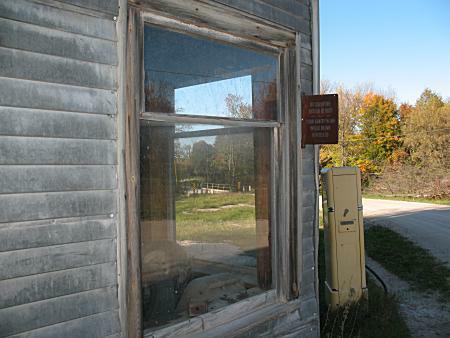
photo - mw
_______________________
A riff on refuge
Stephen Dunn
...there are refuges that are just watering holes on the way to nowhere. The refuge of the habitual-the comfort of it, the stasis. The refuge of wishing to please-those little forays into hackdom that injure the soul. The refuge of the lie, how it buys time, lets you ride for a while in its big white car.
I tell my students the public wants excitement without danger, wants the artist to be considerate enough to stop before his bones show, to please not be so tacky as to disturb. I talk about the refuge of the neatly wrapped package. The refuge of the melodious. The refuge of entertainment and distraction that all of us except those artists who go all the way seem to need.
Books, though, have been my most enduring refuge, not the ones I've written, but the ones I've read—my good, long disappearances into them, how they always return me to the world; in the best of instances, to an enlarged world. In fact, a world with more places than I could have imagined in which to hide, get lost, or be found. A great book is a refuge for those with what Keats called "negative capability," those of us more or less at home with uncertainties, who are not made entirely miserable by the burden of consciousness.
But I've also found comrades in books merely good, even mediocre. I've loved how some authors manage to give, if not refuge, then a kind of home to the displaced, the misunderstood, the estranged, give them names and secret thoughts, even chapters of their own—and the displaced, the misunderstood, the estranged among us turn the pages and find ourselves there and are less alone.
_______________________

photo - mw
_______________________
Essay on the Personal
Stephen Dunn
Because finally the personal
is all that matters,
we spend years describing stones,
chairs, abandoned farmhouses--
until we're ready. Always
it's a matter of precision,
what it feels like
to kiss someone or to walk
out the door. How good it was
to practice on stones
which were things we could love
without weeping over. How good
someone else abandoned the farmhouse,
bankrupt and desperate.
Now we can bring a fine edge
to our parents. We can hold hurt
up to the sun for examination.
But just when we think we have it,
the personal goes the way of
belief. What seemed so deep
begins to seem naive, something
that could be trusted
because we hadn't read Plato
or held two contradictory ideas
or women in the same day.
Love, then, becomes an old movie.
Loss seems so common
it belongs to the air,
to breath itself, anyone's.
We're left with style, a particular
way of standing and saying,
the idiosyncratic look
at the frown which means nothing
until we say it does. Years later,
long after we believed it peculiar
to ourselves, we return to love.
We return to everything
strange, inchoate, like living
with someone, like living alone,
settling for the partial, the almost
satisfactory sense of it.
3 Poems by Stephen Dunn
From New & Selected Poems 1974-1994
_______________________
Precision and Soul: Essays and Addresses
Robert Musil
edited and translated by Burton Pike and David S. Luft
google books
via Dispatches from Zembla

photo - mw
_______________________
Eight years on - and I'm still churning out.
Many thanks for all your support and appreciations over the years - mw
_______________________
The Monument
Elizabeth Bishop
d. October 6, 1979
It is an artifact
of wood. Wood holds together better
than sea or cloud or and could by itself,
much better than real sea or sand or cloud.
It chose that way to grow and not to move.
The monument's an object, yet those decorations,
carelessly nailed, looking like nothing at all,
give it away as having life, and wishing;
wanting to be a monument, to cherish something.
The crudest scroll-work says "commemorate,"
while once each day the light goes around it
like a prowling animal,
or the rain falls on it, or the wind blows into it.
It may be solid, may be hollow.
The bones of the artist-prince may be inside
or far away on even drier soil.
But roughly but adequately it can shelter
what is within (which after all
cannot have been intended to be seen).
It is the beginning of a painting,
a piece of sculpture, or poem, or monument,
and all of wood. Watch it closely.
Poems by Elizabeth Bishop
"Controlled Panic":
Mastering the Terrors of Dissolution and Isolation in Elizabeth Bishop's Epiphanies
Martin Bidney
Style, Fall, 2000
A Formal, Melancholy Soul: Elizabeth Bishop
Casey N. Cep
_______________________
“The misperception that Niedecker worked in isolation and that her work was unmediated by cultural forces beyond the local has, of course, delayed critical recognition of some properties of her poems more than others – namely, the extent of their engagement with collage, their attention to the semantic depths of words, the international and transhistorical qualities of their address, the intricacy of their engagement with biography, biology, politics, popular culture, canonical literature, and even a critical sense of regional identity itself. Meanwhile, the compensating impulse to link Niedecker exclusively with international modernism obscures other aspects of her work.”
- Elizabeth Willis
Radical Vernacular: Lorine Niedecker and the Poetics of Placeessays edited by Elizabeth Willis
reviewed byRon Slate
Art, then, simultaneously demands discovery and avoidance, adoration and disdain. Concentration is anticipation of the correct and essential in the not-yet-arrived – and vigilance against the habit of rutted recurrence. But the former is rarely sealed from the dispensable, and the latter is infiltrated by echoes of inbred sounds. Art is hard to make except when, as Hank says, it’s easy.
Divide the world into types of poets if you like, into schools, sects or cells. But there are never more than a few true concentrators in any group you may prefer. The poet discovers and feels a deep affinity for a particular poetic mode, and concentration begins, as Paul Valéry wrote, “when one’s imagination is stimulated by the difficulties inherent in one’s art and not if one’s imagination is dulled by them.” Lorine Niedecker (1903-70) dreamed Zukofsky’s dream and found a conveyance proper to her psyche. But where Zukofsky spent years giving vent to his superfluities, Niedecker “affirms both adequacy and deprivation,” as Rachel Blau DuPlessis so aptly notes in her essay “Lorine Niedecker’s ‘Paean to Place’ and Its Reflective Fusions,” a most insightful contribution to Radical Vernacular. Niedecker was the ultimate concentrator, or as she put it, “condenser.” ...(more)
_______________________

petit maison esterno
Le Corbusier
Le Corbusier - Wikimedia Commons
_______________________
Greenscapes ~ Sense and Meaning
"Fields of Dreams: Landscapes of Myth and Imagination"
call for papers
Our landscapes have long been the unconscious repository of cultural hopes, fears and desires. From the Garden of Eden to aboriginal Dreamtime, societies have perceived their surrounding natural environment to express cultural values reflected in their myths, legends, sacred texts and belief systems. The occupation, transition, or representation of landscape constitutes an imaginative exercise for both subject and object. Yet imagination is not a consciously controllable process, and dreams can be unsettling portents as well as expressions of wish-fulfillment. We welcome papers that explore landscapes of myth and imagination in real and virtual sites, literary texts, images, and installations...
via Steve Himmer
_______________________
The Cape Cod Blues
Hayden Carruth
Well, the wind from the ocean's a dark, dark wind
and the ocean is dark as well
and the shrieks of the sea birds flying
sound like the damned in hell
the houses are dark, the people dark
the mussel dark in his shell
the water that crawls on the strand is sighing
a legend of torment to tell
and broken down in the little town
a tower with a broken bell
is clanking a dire death-knell
Give me my upland forest
with its ferny glen, its glade
of the hazelbloom in a dappled shade,
where I and the earth-girl dwell.
quoted in
Remembering Hayden Carruth
John Lundberg
_______________________
William Grimes on Carruth
The tension between the chaos of the human heart and the sublime order of nature imbued his best work with a sense of momentous struggle, “a Lear-like words-against-the-storm quality,” as the critic Geoffrey Gardner put it. Mr. Carruth wrote: “My poems, I think, exist in a state of tension between the love of natural beauty and the fear of natural meaninglessness or absurdity.”
_______________________

Louisiana Abandoned Samuel Portera
_______________________
The Ponzi-Plus Plan
Jim Kunstler
This is a train wreck of investment vehicles so complex that they could only be created with the aid of computers. The result is that hardly anyone -- perhaps even nobody in or out of Wall Street -- really understands what they represent. In fact, this alphabet soup of engineered securities -- CDOs, CDSs, MBSs, SIVs, etc -- was cooked up from a recipe of Ponzi algorithms. They were designed to be mathematically indecipherable, except by computers, in an alternative universe of model-making that bore only a superficial relation to the real world. That was their dirty secret. And the dirty secret of the Great Bail-out is that, in the real world, we will never be able to discover the actual trading value of these things at any number above zero. This is why they are called "toxic."(....)
What the mainstream is truly missing here en masse is that another tsunami is building right behind the finance fiasco, and that it will render moot the whole reeking cargo of schemes and wishes that comprises the Great Bail-out. I am speaking of the global oil problem. In fact, the problems in banking and money currently roaring in the center ring of the world circus, can be described categorically as a product of the oil problem -- since oil is the primary resource of industrial economies and therefore the motive force behind our ability to generate "wealth." Without reliable and ever-growing supplies of oil, there is no industrial growth, and without industrial growth things like capital investment instruments lose their legitimacy. That is why the Frankenstein family of Ponzi securities was invented in the first place -- to compensate for the demise of industrial growth by creating wealth out of... nothing!...(more)
via Gift Hub
_______________________
The Coming Collapse of the Middle Class
Elizabeth Warren
UC Berkeley Graduate Council Lectures
youtube
via
Gift Hub
_______________________
Reflections Upon a Coup by Banksters
Richard at american leftist
...if conditions deteriorate to an extent not seen since the mid-1970s, or, one shudders to say it, even the 1930s, then, there are always poor people, people of color and undocumented immigrants to blame. The willingness of the mortgage lending community to target the requirements of the Community Reinvestment Act as one of the causes of this crisis is not reassuring in this regard. It suggests that the financial sector will, if no alternative is perceived, manipulate the bigotries of racist and xenophobic elements to resist any progressive assault upon its autonomy.
We may be about to enter a period with much more frightening dimensions than people being foreclosed out of their houses and forced to go to food banks....(more)
_______________________
Wall Street Financiers Cash in on Crisis
Tim Shipman
_______________________
Cut, Kill, Dig, Drill
Jonathan Raban
Sarah Palin has put a new face and voice to the long-standing, powerful, but inchoate movement in US political life that one might see as a mutant variety of Poujadism, inflected with a modern American accent.
_______________________
Sara Benincasa’s series of Sarah Palin vlogs
more at 23/6
God's Plan for America
(As Revealed to Todd Palin After Several Busch Light 40-Ouncers)
Joseph Minton Amann and Tom Breuer
via The Morning News Digest _______________________

Happy Jack Church
Samuel Portera his Wetlands series is featured in Fraction online photography magazine.
_______________________
Palin’s Alternate Universe
Bob Herbert
...a smiling, bubbly vice-presidential candidate who travels in an alternate language universe. For Ms. Palin, such things as context, syntax and the proximity of answers to questions have no meaning.
Palin and Language, McCain and Strategy, “Supporting Our Troops,” and Alfred E. Newman Redux
Stephen Lewis Hak Pak Sak
Note the protruding ears, the shining eyes, the wrinkle-fee brow, and the smile masking … absolutely nothing. Mad afficianados will not be surprised if in a future malapropism Palin refers to the US commander in Afghanistan as “General Potrzebezi.” Palin’s motormouth presentation and seeming lack of logic also struck a familiar note … the onstage persona of American commedienne Kathy Griffin, whose non-stop patter and unexpected mid-sentence swerves in subject matter turn her appearances on CNN’s Larry King Live into a dadaist comeuppance.
_______________________
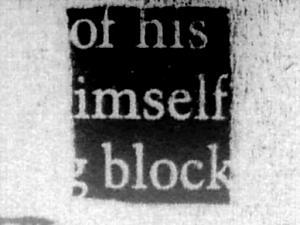
from STAMPOLOGUE
Nico Vassilakis
Five Sequences
ebook by Nico Vassilakis
Tom Beckett interviews Nico Vassilakis
Visual Poetry by Nico Vasilakis
9th St. Laboratories
via Nick Piombino (fait accompli)
Nico Vassilakis at Subtext
Nico Vassilakis - Visual Poetry
The Continental Review
youtube
Nico Vassilakis's Vowelist in Audio and Videos
Text Loses Time
Nico Vassilakis
Crag Hill's ManyPenny Press
_______________________
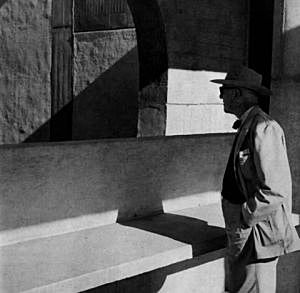
Le Corbusier
b. Oct 6, 1887
_______________________
from
The Cows At Night
by Hayden Carruth
Always a shock
to remember them there, those
great breathings close in the dark.
I stopped, and took my flashlight
to the pasture fence. They turned
to me where they lay, sad
and beautiful faces in the dark,
and I counted them–forty
near and far in the pasture,
turning to me, sad and beautiful
like girls very long ago
who were innocent, and sad
because they were innocent,
and beautiful because they were
sad. I switched off my light.
But I did not want to go,
not yet, nor knew what to do
if I should stay, for how
in that great darkness could I explain
anything, anything at all.
I stood by the fence. And then
very gently it began to rain.
_______________________

photo - mw
_______________________
The "Rejection of Closure," examines the concept of an 'open' and 'closed' text in socio-political terms:
the ‘open text,’ by definition, is open to the world and particularly to the reader. It invites participation, rejects the authority of the writer over the reader and thus, by analogy, the authority implicit in other (social, economic, cultural) hierarchies…..The ‘open text’ often emphasizes or foregrounds process….and thus resists the cultural tendencies that seek to identify and fix material, turn it into a product; that is, it resists reduction.
Hejinian's definition is helpful in my growing appreciation and understanding of the notion of ecopoetry, as well as texts such as Dionne Brand's Inventory and Dennis Lee's Yes/No. Hejinian is adamant about placing the composition of verse under the scrutiny of philosophy, sociology, and politics, in addition to that of literary and linguistic value systems. This concept of a responsibility in verse to consider modes of thinking outside the literary seems painfully obvious, though is met with resistance by many purists in the field (those who value notions of tradition above all else).
_______________________
Issue 1
hey - even I'm in there
The Issue 1 PDF Thing
K. Silem Mohammad adds his response to those in these threads 1 2
Issue 1 polite clarification
further explication from Stephen McLaughlin
_______________________
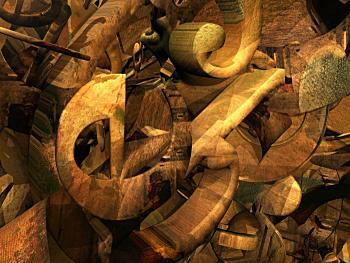
deadfall
invisible notes
Peter Ciccariello
_______________________
Epistemology
Camelia Elias on Robert Gibbons' 62nd (and the joy of fragments).
The displaced “it.” Today we’ll call “it” champagne. To you.
.....................................................
Belated Happy Birthday (and anniversary congratulations) Robert. _______________________
String Theory Sutra
Brenda Hillman
There are so many types of
“personal” in poetry. The “I” is a needle some find useful, though
the thread, of course, is shadow.
In writing of experience or beauty, a cloth emerges as if made
from a twin existence. It's July
4: air is full of mistaken stars & the wiggly half-zeroes stripes
make when folded into fabric meant
never to touch ground ever again— the curved cloth of Sleeping Beauty
around 1310, decades after the spinning
wheel gathered stray fibers in a whir of spindles before the swath
of the industrial revolution, & by
1769 a thread stiff enough for the warp of cotton fabric from
the spinning frame, the spinning jenny,
the spinning "mule" or muslin wheel, which wasn't patented. By its, I
mean our, for we would become
what we made. String theory posits no events when it isn't a
metaphor; donuts twists in matter—10
to the minus 33 cm—its inverted fragments like Bay Area poetry—
numbers start the world for grown-ups
& wobbly fibers, coaxed from eternity, are stuffed into stems of dates
like today so the way people
are proud of their flag can enter the pipes of a 4.
(......)
Why was love the meaning thread. Textiles give off tiny singing no
matter what: washable rayon, airport
carpets, checked flannel smocks of nurses, caps, pillowcases, prom sashes, & barbecue
aprons with insignias or socks people
wear before/during sexual thrills after dark subtitled Berkeley movies next to
t-shirts worn by crowds in raincoats.
Human fabric is dragged out, being is sewn with terror or awe
which is also joy. Einstein called mystery
of existence “the fundamental emotion.” Remember? You unraveled in childhood till
you were everything. By everything I mean
everything . The unicorn puts its head on your lap; from there it
sees the blurry edge. How am
I so unreal & yet my thread is real it asks sleepily~~
...(more)
From Pieces of Air in the Epic by Brenda Hillman
Pieces on «Pieces of Air in the Epic», by Brenda Hillman Barbara Claire Freeman, Editor. jacket
The Grand Permission
new writings on poetics and motherhood
Patricia Dienstfrey, Brenda Hillman, Rachel Blau DuPlessis
google books
Cascadia
Brenda Hillman
google books
Death Tractates
Brenda Hillman
google books
_______________________

Brian O'Nolan
Flann O'Brien / Myles na gCopaleen
5 October 1911 - 1 April 1966 the no-bicycle page
The entire corpus of existing literature should be regarded as a limbo from which discerning authors could draw their characters as required, creating only when they failed to find a suitable existing puppet. The modern novel should be largely a work of reference. Most authors spend their time saying what has been said before—usually said much better. A wealth of references to existing works would acquaint the reader instantaneously with the nature of each character, would obviate tiresome explanations and would effectively preclude mountebanks, upstarts, thimbleriggers and persons of inferior education from an understanding of contemporary literature.
From At Swim-Two-Birds
Flann O'Brien
The Last Laugh
Joseph O’Neill on Brian O'Nolan Atlantic
Modern sublime: the world of Josef Koudelka
Bruno Chalifour
Afterimage, March-April, 2003
Reading Flann Brian O’Brien O’Nolan
Gilbert Sorrentino
Context
An atomy of the novel:
Finn O'Brien's 'At Swim-Two-Birds.'
David Cohen
Twentieth Century Literature, Summer, 1993
Dalkey Archive Press publishes Brian O'Nolan .....................................................
A pub without a side-door up a lane would have been as well off with no door at all
- Flann O'Brien
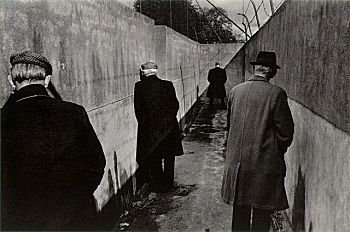
Ireland
Josef Koudelka
1 2 3
.....................................................
Canned Darkness......
Flann O'Brien/Myles na gCopaleen/Brian O'Nolan
De Selby
Beginning of Excerpt: Footnote (1)
From chapter 8 of The Third Policeman
Not excepting even the credulous Kraus (see his Do Selby's Leben), all the commentators have treated de Selby's disquisitions on night and sleep with considerable reserve. This is hardly to be wondered at since he held (a) that darkness was simply an accretion of 'black air', i.e., a staining of the atmosphere due to volcanic eruptions too fine to be seen with the naked eye and also to certain 'regrettable' industrial activities involving coal-tar by-products and vegetable dyes; and (b) that sleep was simply a succession of fainting-fits brought on by semi-asphyxiation .....(....)
A significant feature of the matter is the absence of any authoritative record of those experiments with which de Selby always sought to support his ideas. It is true that Kraus (ace below) gives a forty-page account of certain experiments, mostly concerned with attempts to bottle quantities of 'night' and endless sessions in locked and shuttered bedrooms from which bursts of loud hammering could be heard. He explains that the bottling operations were carried out with bottles which were, 'for obvious reasons', made of black glass. Opaque porcelain jars are also stated to have been used ,with some success'. To use the frigid words of Bassett, such information, it is to be feared, makes little contribution to serious deselbiana (sic).' Very little is known of Kraus or his life. A brief biographical note appears in the obsolete Bibliographie de de Selby. He is stated to have been born in Ahrensburg, near Hamburg, and to have worked as a young man in the office of his father, who had extensive jam interests in North Germany. He is said to have disappeared completely from human ken after Hatchjaw had been arrested in a Sheephaven hotel following the unmasking of the de Selby letter scandal by The Times, which made scathing references to Kraus's 'discreditable' machinations in Hamburg and clearly suggested his complicity. If it is remembered that these events occurred in the fateful June when the County Album was beginning to appear in fortnightly parts, the significance of the whole affair becomes apparent. The subsequent exoneration of Hatchjaw served only to throw further suspicion on the shadowy Kraus. ...(more)
_______________________

Untitled #25
from Changing Chicago Project
1988
Rhondal McKinney via Jim Johnson
_______________________
Conversation strives toward silence, and the listener is really the silent partner. The speaker receives meaning from him; the silent one is the unappropriated source of meaning. The conversation raises words to his lips as do vessels, jugs. The speaker immerses the memory of his strength in words and seeks forms in which the listener can reveal himself. For the speaker speaks in order to let himself be converted. He understands the listener despite the flow of his own speech; he realizes that he is addressing someone whose features are inexhaustibly earnest and good, whereas he, the speaker, blasphemes against language.
But even if he revives an empty past through orgiastic excitement, the listener hears not words but the silence of the present. For despite the flight of spirit and the emptiness of words, the speaker is present; his face is open to the listener, and the efforts made by his lips are visible. The listener holds true language in readiness; the words enter him, and at the same time he sees the speaker.
Whoever speaks enters the listener. Silence, then, is born from the conversation. Every great man has only one conversation, at whose margins a silent greatness waits. In the silence, energy was renewed; the listener led the conversation to the edge of language, and the speaker creates the silence of a new language, he, its first auditor.
Silence is the internal frontier of conversation.............. The Metaphysics of Youth
Walter Benjamin
Selected Writings Vol.1, 1913-1926. Ed. Marcus Bullock, Michael W. Jennings
medifire download
_______________________

photo - mw

White Canoe
Peter Doig at Tate Britain
_______________________
Textual Communities: Nancy, Blanchot, Derrida
Kuisma Korhonen
culture machine
You find yourself in a dark room with a table, a chair, and a small circle of candlelight. On the table lies an open book. You are facing the text, and nothing but the text. Everything else in the room disappears in the shadows. There is nothing but the text and you, encountering each other in the, so it seems, eternal presence of Midnight.
This is the scene that we find at the beginning of Stephane Mallarmé’s Igitur, a scene that we could call the primal scene of pure textual encounter. This is our phantasmatic image of reading: a moment of perfect communication, where we find the textual other waiting for us, lying on the table, always ready and willing to give itself to us; and the textual other finds us alone, in perfect solitude where we are ready to yield ourselves completely to it, with nothing that could disturb the pure ecstasy of encounter, in the presence that is Midnight, the end of time. In this scene, I find myself totally outside myself, in the text, the text being totally outside itself, in me. There is nothing that could put an end to the pure, never-ending circle of reflection between me and the text, this exchange where all thirds are at least temporarily excluded.
Yes, I know: this scene has never taken place. It is only a phantasm, a vulnerable hope for communication that would not be as imperfect as encounters in real life necessarily are. In real life, there is always a third in the room, even when we read in solitude. Textual encounters are always interrupted encounters: the ecstatic exchange between the text and the reader is never complete, and the circle of reflection is always broken by our awareness of a larger textual community. ...(more)
_______________________
Notes of a Historyteller
Paul Lussier
Common-place
Facts alone seldom change how people think about their past. Stories, however, go where facts cannot, speaking directly to myths that shape culture. Those of us who want to change collective memory are compelled, in my view, to take stock of how traditional historical narratives have managed to achieve such deep entrenchment in our culture. (...)In my view, to successfully shake the popular hold of traditional "cherry-tree" mythology, social history must tell its own stories based on its own paradigms of history. We must become historytellers. I recognize fully that the exigencies of stories that appeal to a broad public--good vs. evil, pace, structure--require above all else an overarching viewpoint, and this might seem, at first blush, incongruous with the basic methods and principles of historical inquiry. But in answer to the concern that such consensus making must involve compromise, nostalgia, or false heroics, I offer Last Refuge of Scoundrels, which I like to think achieves consensus sufficient for good storytelling while avoiding these pitfalls. (...)I fear that, without embracing story, the noble endeavors of social history will remain as marginalized and ghettoized as the lives of ordinary men and women whose perspectives we must continue to hail....(more)
_______________________

photo - mw
_______________________
from
Windows
Linda Bierds
We took the panes
with us from cottage to cottage,
moth-horn and glass, and wedged up
the misfitted gaps with a poultice
of gunny and wax. When woodsmoke
darkened our bricks, we gave
to the windowsills a lacquer
of color—clear blue with a lattice
of yellow: a primary entrance and exit
for light. And often, walking home
from the river and small cheese shop,
we would squint their colors to a sapling
green, and remember the hull
of that early body, the slap of fear
we suffered there, then the little wash
of recovery that is our fashion—how
we stroked to her bones a cadenced droning,
and took back from her absence, our
amber, half-literal method of sight.
...(more)
Unwinding the Given: On Linda BierdsJeff Encke octopus magazine
Surely we can excuse Bierds the metronomicity of her lyric, especially if we regard the poems as collectively scavenging a Stevensian dump for discarded images, sounds and sensibilities with which to reconstruct a sense of self. Ask Bierds, and she will tell you of her “Bildungsroman-as-anthology,” a scrapbook of favorite poems 30 years in the making, a shoal of words and imagery across which she has scuttled for decades, Thomas Wyatt’s “They Flee From Me” under one rock, Samuel Coleridge’s “Frost at Midnight” under another. Her tidepool openly embraces historical and formal difference, assimilating individual poetic achievement into the collective voice that sings to her inner ear. If Bierds’ music drones, it is the irresistible drone of nature and human habit.
Collectively, the poems comprise an elegy to a missing sense, a lost knowledge of temporal and spatial absolutes, as compulsory as an amputee’s urge to itch a phantom limb. ...(more) _______________________
Laughing with Kafka
David Foster Wallace
Harper's Magazine, July 1998
For me, a signal frustration in trying to read Kafka with college students is that it is next to impossible to get them to see that Kafka is funny...Nor to appreciate the way funniness is bound up with the extraordinary power of his stories.(....)
What Kafka's stories have, rather, is a grotesque and gorgeous and thoroughly modern complexity. Kafka's humor -- not only not neurotic but _anti_-neurotic, heroically sane -- is, finally, a religious humor, but religious in the manner of Kierkegaard and Rilke and the Psalms, a harrowing spirituality against which even Ms. O'Connor's bloody grace seems a little bit easy, the souls at stake pre-made....(more)
via Mark Thwaite
_______________________
Remembering Carruth
collected links at Harriet
_______________________
Right Again
The passions of John Stuart Mill
Adam Gopnik
...most philosophical projects die with the philosopher. Mill’s thought, as his biographer says, is alive right now on every page of the morning paper. When we debate gay marriage, or abortion rights, or due process for the Guantánamo detainees, we’re still working out the consequences of his thoughts and his practice.(....)When he died, in 1873, worn out by work, writers in the mainstream press in London mocked him for the beliefs that time has shown to be most utterly right. They sneered at his support for women's equality, which had fallen into eclipse in that decade; he must himself have been "feminine" to have supported such a silly thing, and his opposition to slavery had been unrealistically "obstinate." His working-class admirers helped raise a statue to him on the Thames Embankment. But Mill asked to be interred in a remote French town. Five people came to his burial. This was the one place he wanted to be, with Harriet, in the tiny cemetery outside Avignon, where he could rest beside the one love he had had. In the end, it was all he knew....(more)
_______________________
FactChecking Biden-Palin Debate
_______________________
...it was in the 1930s that modern fundamentalism’s strange marriage of laissez-faire economics and heavily-regulated morals was first consummated.
This is not a Religion Column: Biblical Capitalism
Jeff Sharlet
The biggest Faith-Based Initiative of the Bush years, of course, has been its management of the economy. From the Great Depression to what we hope will merely be our greatest recession, the doctrine of free market fundamentalism remains the alpha and the omega of American conservatism. That doesn’t prevent Christian conservatives from favoring government subsidies for the rich; they simply reframe it as God’s will, recruiting the creator as a crony. Biblical capitalism isn’t, ultimately, a supply-and-demand religion. Between business conservatism’s love of laissez-faire and religious conservatism’s love of an interventionist god—McCain’s tax cuts for the rich and Palin’s prayers for a new Alaskan pipe line—the only salvation to be found is in the form of bail-outs, indulgences, to borrow a pre-Protestant term. And those are reserved for “the new chosen,” as the Fellowship calls America’s elite, all those now preparing for cozy afterlives to their public lives in penthouses and beach houses and a ranch down in Crawford....(more)
_______________________
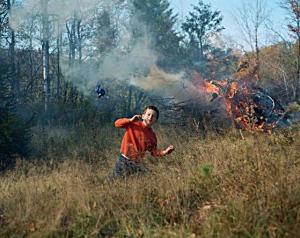
Wellfleet, 1993
Philip-Lorca DiCorcia
_______________________
if the social is made coherent by discursive arrangements...
Bruce Andrews
"[I]f society holds itself together largely through coercions at the level of class, then you can think about that pretty much in terms of negative power, and you can challenge that by putting forward, by proposing, already-existing packagings of meaning which have been excluded, have been kept down, have been beaten up with weaponry owned by the state or by capital; but if the social is held together by the productivity of meaning, if the social is made coherent by discursive arrangements or positivities, then recognizing that opens up some avenues for writing, opens up some ways of getting that implicated in the writing [i.e. "already-existing packagings of meaning" are now questionable, as they are themselves an aspect of "positive power," of the "productivity of meaning"]. So I think some of those things are floating around in the background of a phrase like that ["positive power"]. In some ways it's too easy, because it [writing strategies formulated from a notion of "positive power"] glamorizes the role of operating with discourse, but you see that glamorizing of discourse in all the arts in so-called postmodernism . . . that lead away from abstraction as an interesting possibility in most art forms. So what I'm grappling with is my refusal to abandon the project of exploring the sign, signification, and not just saying, OK, let's just deal with discourse, let's just ironically, appropriatively, assemble existing social materials and bring them together in interesting, clashing ways and do appropriation art, do that genre of work. I'm still interested in the basic foundational structure of meaning, in its material form in the sign, but I want to push that further, not just abandon it and move to the level of social commentary the way a lot of people are interested in doing now, but to try to retain the interest in sound and sight and materiality at the level of the letter, syllable, paragraph, syntactical micro-unit, but still get into the thing, get into the work, some of this other material."
- from a 1990 interview, entitled "North by Northwest Interview," in Paradise & Method (Northwestern UP 1996)
Bruce Andrews at the Electronic Poetry Center
THE POETICS OF L=A=N=G=U=A=G=E
Bruce Andrews
Bruce Andrews feature at Jacket
Bruce Andrews: the political science writings
_______________________
Simple Truths, Hard Problems: [PDF]
Some
thoughts on terror, justice, and selfdefence
Noam Chomsky
Humanitarian Imperialism: The New Doctrine of Imperial Right
Noam Chomsky
Visions of Righteousness [pdf]
Noam Chomsky
_______________________
From Empire to Democracy
Howard Zinn
Let's not waste $700bn on a bail-out, but use 'big government' for what it's best at – shaping a society that is fair and peaceable.
Talking with the People's Historian Howard ZinnRobert Birnbaum identity theory
_______________________
Safe
Linda Bierds
from "The Profile Makers"
Safe, we thought.
The flood waters nestled
the arc of their udders, but no higher,
dewlaps, flanks, even the tips of the briskets,
dry. All day they stood
in the sea-scape meadow,
their square heads turned from the wind.
By evening they were dead.
Chill, we learned, not drowning,
killed them -- the milk vein
thick on the floor of the chest
filling with cold, stunning the heart.
We had entered the house, where silt-water
sketched on the walls and doorways
a single age-ringing. When we looked back
they had fallen, only the crests of their bodies
breaking the waterline. I remember
the wind and a passive light,
then the jabber of black grackles
riding each shoulder's upturned blade. quoted in
John Marshall on Linda Bierds
Seattle Post-Intelligencer Books
thanks to Steve at roo (the erstwhile Riley Dog) for pointing in Linda Bierds direction.
_______________________

Environmental photography
a photo essay by Stuart Franklin
Magnum Blog
Stuart Franklin's Magnum Portfolio

photo - mw
_______________________
Poem in October
Dylan Thomas
It was my thirtieth year to heaven
Woke to my hearing from harbour and neighbour wood
And the mussel pooled and the heron
Priested shore
The morning beckon
With water praying and call of seagull and rook
And the knock of sailing boats on the net webbed wall
Myself to set foot
That second
In the still sleeping town and set forth.
My birthday began with the water-
Birds and the birds of the winged trees flying my name
Above the farms and the white horses
And I rose
In rainy autumn
And walked abroad in a shower of all my days.
High tide and the heron dived when I took the road
Over the border
And the gates
Of the town closed as the town awoke.
A springful of larks in a rolling
Cloud and the roadside bushes brimming with whistling
Blackbirds and the sun of October
Summery
On the hill’s shoulder,
Here were fond climates and sweet singers suddenly
Come in the morning where I wandered and listened
To the rain wringing
Wind blow cold
In the wood faraway under me.
Pale rain over the dwindling harbour
And over the sea wet church the size of a snail
With its horns through mist and the castle
Brown as owls
But all the gardens
Of spring and summer were blooming in the tall tales
Beyond the border and under the lark full cloud.
There could I marvel
My birthday
Away but the weather turned around.
It turned away from the blithe country
And down the other air and the blue altered sky
Streamed again a wonder of summer
With apples
Pears and red currants
And I saw in the turning so clearly a child’s
Forgotten mornings when he walked with his mother
Through the parables
Of sun light
And the legends of the green chapels
And the twice told fields of infancy
That his tears burned my cheeks and his heart moved in mine.
These were the woods the river and sea
Where a boy
In the listening
Summertime of the dead whispered the truth of his joy
To the trees and the stones and the fish in the tide.
And the mystery
Sang alive
Still in the water and singingbirds.
And there could I marvel my birthday
Away but the weather turned around. And the true
Joy of the long dead child sang burning
In the sun.
It was my thirtieth
Year to heaven stood there then in the summer noon
Though the town below lay leaved with October blood.
O may my heart’s truth
Still be sung
On this high hill in a year’s turning.
_______________________

photo - mw
_______________________
Translation as Breathing New Life in a New Language:
Conversing with Charlotte Mandell
I love reading, and I think translating is the truest form of reading. People are always asking me if I write my 'own' work. I find it hard to convey to them that I feel no need to write-I would much rather 'be' a lot of different authors by translating them. I never read ahead when translating, so translating for me feels like more of a creative process: I have no preconceived notions of how the book will end, and can put myself in the author's place by trying to imagine what will come next. via Pierre Joris
Charlotte Mandell's website
_______________________
The Complexity of Gratitude
Audio Interview with Margaret Visser on The Gift of Thanks
Nigel Beale
_______________________
WIlde Reading Room
BlazeVOX
Our (free) ebooks have an average readership of 7000 downloads per title
_______________________
Exquisite Corpse Annual #1: The Resurrection Issue
_______________________
from
Poem To Shout In The Ruins
Louis Aragon
October 3, 1897 – December 24, 1982
A waltz of mirrors
A dialogue in the void
(...)
Drunkenness sped my run through the martyred oaks
Which bled prophetically while day
Light fell mute over the blue trucks
I remember so many things
So many evenings rooms walks rages
So many stops in worthless places
Where in spite of everything the spirit of mystery rose up
Like the cry of a blind child in a remote train depot
Aragon Interview at UbuWeb Sound
Aragon poems here and here
The mythic and the real: Theater and city of Louis Aragon
Gray Read
In the 1920s, when modern architects called for clarity and light, surrealist poet Louis Aragon described essential architecture as darkness, defined by its interiors and its closures. In plays and prose poems, Aragon evoked the box, the coffin, the room, and objects themselves‹particularly manufactured objects‹ as containers that hold dark mysteries within. His prose lingers at doors, lids, and the visible surface of objects, exploring them as boundaries between light and dark where visible and invisible rub against one another. At these boundaries, Aragon gathered sparks of poetry in the friction between outside and inside, light and dark, and between words and substance. As formative Surrealist texts, much of what Aragon wrote in the early 1920s recognized ordinary buildings and things as thresholds to a kingdom of the marvelous....(more)
.....................................................

Breton, René Hislum,
Louis Aragon, Paul Eluard
1919
Dada in Paris
.....................................................
in the International Dada Archive
Les Aventures de Télémaque
Louis Aragon
1922
Feu de joie. Paris: Au Sans Pareil
Louis Aragon
1920
Anicet, ou, Le Panorama
Louis Aragon
1921
_______________________
Scissors and Paper
Louis Aragon
1930
All the painters that can be called Surrealist, not an insignificant group, have dealt with collage at one time or another. If many of these works are closer to papier collé than they are to the collages of Max Ernst, involving nothing more than a modification of the canvas, they are nevertheless significant, and they arise at decisive moments in the evolution of pictorial art . . . .
This procedure is an innovation, and it is pure foolishness to greet it in a blasé manner. For what use are colors now? A pair of scissors and some paper can take the place of a palette, and they do not put one back in school, as a palette does . . .
Thought is not a sport. It cannot be the pretext for small successes that draw applause. It is not detached. It is not the activity of isolated individuals. The discoveries of all of us bring about the evolution of each of us. If, at a given moment, this or that thing happens, it is not without consequences. And, if painting is no longer what it once was, painters must become aware of this. Those who do not should not be surprised if they are seen as artisans who, at great expense, make products that are rendered useless by the mere reflections of a few contemporaries....(more)
_______________________
Moon
Hai Zi
translated from the Chinese by Ye Chun
Chimney smoke up and down
The moon is a white ape digging a well
The moon is a white ape smiling wanly on the river
How many times blood trickles out of the sky
The white ape flows past a bell tower
The moon is a white ape smiling wanly
The moon breaks its own heart
Six Poems
Hai Zi
translated from the Chinese by Ye Chun
_______________________
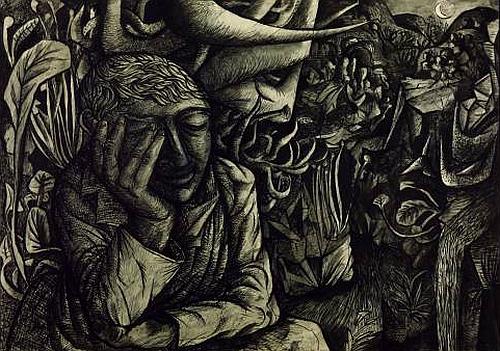
Dreamer in a Landscape
John Craxton
b. 3 October 1922
_______________________
Gonzo Sociology
Alan Wolfe reviews The Politics of Truth: Selected Writings of C. Wright Mills edited by John Summers
Anger, in short, is likely to characterize the American mood in the years following the Bush administration, and few writers were better at expressing anger than C. Wright Mills. Reading him in 1960, the gonzo journalist Hunter S. Thompson wrote that he "jolted me out of my chair. It's heartening to know that there are still people around with the simple guts to move in on the boobs with a chain-mace." Boobs--not the body parts but the political know-nothings--can certainly be taken for granted these days. The only question is whether intellectuals will attack them with chain-maces. If they do, C. Wright Mills will be their man....(more)
_______________________
It seems clearer and clearer to me that anything that appears to hold the possibility of keeping people from driving from their suburban home to their cubicle or the video store, or hanging on to a job so that they can keep their monthly cash flows up to date .. in short, to continue living in the ways they have been accustomed to .. represents a real existential threat to be attacked immediately.
I assume that at some point in time it will become completely psychologically exhausting living in conditions of daily crisis on a large-scale reality television show. And then, I think, things will get really really dangerous for everyone else on the planet.
- Jon Husband in a comment on this threadvia Frank Paynter
_______________________
Radical Empowerment:
Reflection on the Bowen "Art of Hosting" Retreat
Dave Pollard
_______________________

photo - mw
_______________________
"A single seraphic word.
You can examine the word with a click, tracing its origins, development, earliest known use, its passage between languages, and you can summon the word in Sanskrit, Greek, Latin and Arabic, in a thousand languages and dialects living and dead, and locate literary citations, and follow the word through the tunnelled underworld of its ancestral roots ...
And you can glance out the window for a moment, distracted by the sound of small kids playing a made-up game in a neighbor's yard, some kind of kickball maybe, and they speak in your voice, or piggy-back races on the weedy lawn, and it's your voice you hear, essentially, under the Glimmerglass sky, and you look at the things in your room, offscreen, unwebbed, the tissued grain of the deskwood alive in light, the thick lived tenor of things, the argument of things to be seen and eaten, the apple core going sepia in the lunch tray, and the dense measure of experience in a random glance, the monk's candle reflected in the slope of the phone, hours marked in Roman numerals, and the glaze of the wax, and the curl of the braided wick, and the chipped rim of the mug that holds your yellow pencils, skewed all crazy, and the plied lives of the simplest surface, the slabbed butter melting on the crumbled bun, and the yellow of the yellow of the pencils, and you try to imagine the word on the screen becoming a thing in the world, taking all its meanings, its sense of serenities and contentments out into the streets somehow, its whisper of reconciliation, a word extending itself ever outward, the tone of agreement or treaty, the tone of repose, the sense of mollifying silence, the tone of hail and farewell, a word that carries the sunlit ardour of an object deep in drenching noon, the argument of binding touch, but it's only a sequence of pulses on a dullish screen and all it can do is make you pensive -- a word that spreads a longing through the raw sprawl of the city and out across the dreaming bourns and orchards to the solitary hills.
Peace." - Don DeLillo, from "Underworld"

Josef Breitenbach
ca1938 _______________________
The Way Of The Coventicle Of The Trees
Hayden Carruth
Just yesterday afternoon I heard a man
Say he lived in a house with no windows
The door of which was locked on the outside.
This was at a party in New York, New York.
A deep Oriental type, I said to myself,
One of them indescribable Tebootans who
Habitate on Quaker Heights and drink
Mulled kvass first thing every morning
With their vitamins. An asshole. And
Haven't I more years than he? Haven't
I spent them looking out the window
At the trees? Oh the various trees.
They have looked back at me with their
Homely American faces: the hemlocks
And white birches of one of my transient
Homes, the catalpas and honey locusts
Of another, the sweet gum and bay and
Coffee trees, the hop hornbeam and the
Spindle tree, the dogwood, the great.
Horse chestnut, the overdressed pawpaw
Who is the gamin of that dominion.
Then, behind them, the forest, the sodality.
What pizzazz in their theorizing! How fat
The sentimentibilities of their hosannas!
I have looked at them out the window
So intently and persistently that always
My who-I-am has gone out among them
Where the fluttering ideas beckon. Yes,
We've been best friends these sixty-nine
Years, standing around this hot stove
Of a world, hawking, phewing, guffawing,
My dear ones, who will remember me
For a long, long time when I'm gone.
.....................................................

Hayden Carruth
Aug 3, 1921 - Sept 29, 2008
Photo by Al Campanie
Syracuse Post-Standard
In Memoriam - Hayden Carruth
includes a video of his final reading,
from
Ray
Hayden Carruth
What crazies we writers are
our heads full of language like buckets of minnows
standing in the moonlight on a dock. Ray
was a good writer, a wonderful writer, and his
poems are good, most of them and they made me
cry, there at my kitchen table with my head down,
me, a sixty-seven-year-old galoot, an old fool
because all old men are fools, they have to be,
shoveling big jagged chunks of that ordinary pie
into my mouth, and the water falling from my eyes
onto the pie, the plate, my hand, little speckles
shining in the light, brightening the colors, and I
ate that goddamn pie, and it tasted good to me.
...(more)
.....................................................
Agoraphobia is when a stranger enters the house and you go to the attic and lie down with your face pressed into the darkest corner, under the slanting slats of the roof. It’s the scream lurking in your gorge, so ready to burst that the least noise above a cat’s purr makes you tremble: when the marching band from the high school practices in the street outside you sit in the back of the closet, when the March wind lashes the treetops at night you crawl behind the sofa. Agoraphobia is when every night at 2:00 a.m. for five years—that’s 1,825 nights—you go out loaded with Thorazine to walk in the street beneath the dark, blank windows of the houses on either side, and you never get more than a hundred yards from your door. ... Agoraphobia is when you breathe and eat the dust of oblivion.
Hayden Carruth, quoted in Lives of a Poet - Hayden Carruth
_______________________
The Doctor Came at Dawn
Dylan Trigg
Side Effects
The symptomatic emergence of my anxiety was so prevalent that I was convinced that its origin was physical alone. Perhaps, then, I was too hasty in claiming that nausea is both ontologically primary and primordial. No, I suspect that this is far too crude. Rather, we would have to speak of different bodies: the depressed body, the anxious body, the aroused body, and so on. Is nausea revealed, as being there all along (to paraphrase Heidegger)? I doubt it. The anxious body and the non-anxious body are incommensurable with one another: both worlds are as real as the other, but there’s no point of intersection between these bodies.
I have reached the end of this journey into the nauseous and fragmented world of place and memory, in which I found little evidence of Bachelard’s “motionless memory.” But what remains to be done is a topography of different bodily modes of being-in-the-world. I am looking beyond the twilight world of body memory: its demands are exacting. In contrast, in the future, I would like to think of bodily empowerment. The power of.......(more)
_______________________
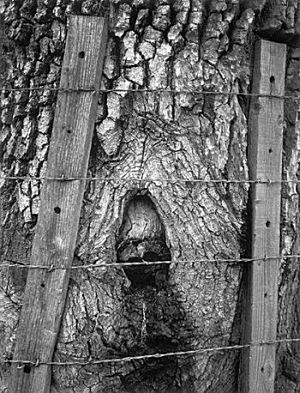
Private Property
Prisoners of Our Own Device
Photography by David Stock
ZoneZero
_______________________
The American Dream
Lebbeus Woods
Whether they are living in Denver suburbs or Lower Manhattan, homeowners have an eye on the real estate market. If they can sell at a high price, they can afford to move upward, to a better and more expensive home. Leaving aside the issue of those who cannot keep up in this game (and there are many), and lose their homes (becoming effectively 'homeless'), or who have to move because their jobs are lost, or they get transferred and have to sell at any price, it is clear that the character of the American Dream of home ownership has changed radically.
Is it time for a new Dream? Clearly it is, and Martin Luther King, Jr.’s (“I have a dream”) is hopeful as a model of what it might be. Architects, locked for so long in the ideal of home ownership—from Frank Lloyd Wright’s Broadacre City, where everyone would have their sovereign acre of prairie (and a Wright house planted squarely on it), to Frank Gehry’s twisty luxury condo tower in Lower Manhattan—have difficulty generating any comparable vision of the American home. It is telling that the most gifted designers today—American and not—can only come up with snappy new wrappers for prevailing, but finally fading, ideas. The current bursting of the “housing bubble,” and the coming financial shakeout, which will be global in extent, and giga in scale, could leave them with more time to consider the reality of how most people live, and about the nature of home in the contemporary world.
The concept of non-ownership would be good a place to start. Or, at least, with the idea that money is not at the core of it.
_______________________
Common Stock
Charles Bernstein
Believing that fundamental conditions
of the country are sound and that there
is nothing in the business situation to warrant
the destruction of values that has taken place
on the exchanges during the past week,
my son and I have for some days
been purchasing sound common stocks.
– John D. Rockefeller (1929)
Trades that are
injurious to
climate – gradient
of the supreme
effort to scale
a thorn
that hulls us
firm beyond
bounty. Hucksters
rescinding voracious
declamation
hopes
of a
pear, soft
and oval
to the knot without
tangle that braids
the dole.
Or derring-done,
sometimes seated,
that stills
with pliant
warrant.
Scuttle
behind or before anyone
has a leg to
laugh off.
...(more)
from With Strings by Charles Bernstein
_______________________
Poem Catching Up With An Idea
Hayden Carruth
Freedom is not to be proved but is rather a postulate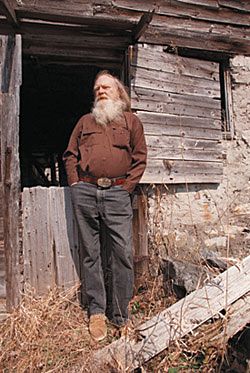 of action. Thus excellent Berdyaev,
who has meant much to me,
although I must shake my head and make a face
when he undertakes to explain
the Holy Ghost. We are unbelievers,
Cindy, which may be (I regularly
think it is) our misfortune. But we are still
existentialist lovers. Yes,
strange Soren Kierkegaard of Hamlet's province
would approve of us--well, somewhat--in our unchurchly
dark
devotions. In Syracuse the rain falls every day,
or so it seems; the faces
of the good unchurchly burghers of Edgehill Road
are as bland as marshmallows and as puffy.
To live here, to love here,
as Jack our friend the Gilbert would say,
sighing, smiling,
requires an extraordinary knowledge of freedom,
unhistorical and reinvented by us here in every
act, as when I brought for you for a love token
the plastic sack of just sprouted lilies-of-the-valley
to plant around the steps of our arched doorway.
That was phenomenon, not poetry, not symbol, the act
without a proof, freedom-in-love.
of action. Thus excellent Berdyaev,
who has meant much to me,
although I must shake my head and make a face
when he undertakes to explain
the Holy Ghost. We are unbelievers,
Cindy, which may be (I regularly
think it is) our misfortune. But we are still
existentialist lovers. Yes,
strange Soren Kierkegaard of Hamlet's province
would approve of us--well, somewhat--in our unchurchly
dark
devotions. In Syracuse the rain falls every day,
or so it seems; the faces
of the good unchurchly burghers of Edgehill Road
are as bland as marshmallows and as puffy.
To live here, to love here,
as Jack our friend the Gilbert would say,
sighing, smiling,
requires an extraordinary knowledge of freedom,
unhistorical and reinvented by us here in every
act, as when I brought for you for a love token
the plastic sack of just sprouted lilies-of-the-valley
to plant around the steps of our arched doorway.
That was phenomenon, not poetry, not symbol, the act
without a proof, freedom-in-love.
|

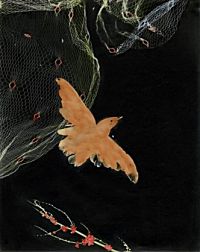































































 of action. Thus excellent Berdyaev,
who has meant much to me,
although I must shake my head and make a face
when he undertakes to explain
the Holy Ghost. We are unbelievers,
Cindy, which may be (I regularly
think it is) our misfortune. But we are still
existentialist lovers. Yes,
strange Soren Kierkegaard of Hamlet's province
would approve of us--well, somewhat--in our unchurchly
dark
devotions. In Syracuse the rain falls every day,
or so it seems; the faces
of the good unchurchly burghers of Edgehill Road
are as bland as marshmallows and as puffy.
To live here, to love here,
as Jack our friend the Gilbert would say,
sighing, smiling,
requires an extraordinary knowledge of freedom,
unhistorical and reinvented by us here in every
act, as when I brought for you for a love token
the plastic sack of just sprouted lilies-of-the-valley
to plant around the steps of our arched doorway.
That was phenomenon, not poetry, not symbol, the act
without a proof, freedom-in-love.
of action. Thus excellent Berdyaev,
who has meant much to me,
although I must shake my head and make a face
when he undertakes to explain
the Holy Ghost. We are unbelievers,
Cindy, which may be (I regularly
think it is) our misfortune. But we are still
existentialist lovers. Yes,
strange Soren Kierkegaard of Hamlet's province
would approve of us--well, somewhat--in our unchurchly
dark
devotions. In Syracuse the rain falls every day,
or so it seems; the faces
of the good unchurchly burghers of Edgehill Road
are as bland as marshmallows and as puffy.
To live here, to love here,
as Jack our friend the Gilbert would say,
sighing, smiling,
requires an extraordinary knowledge of freedom,
unhistorical and reinvented by us here in every
act, as when I brought for you for a love token
the plastic sack of just sprouted lilies-of-the-valley
to plant around the steps of our arched doorway.
That was phenomenon, not poetry, not symbol, the act
without a proof, freedom-in-love.